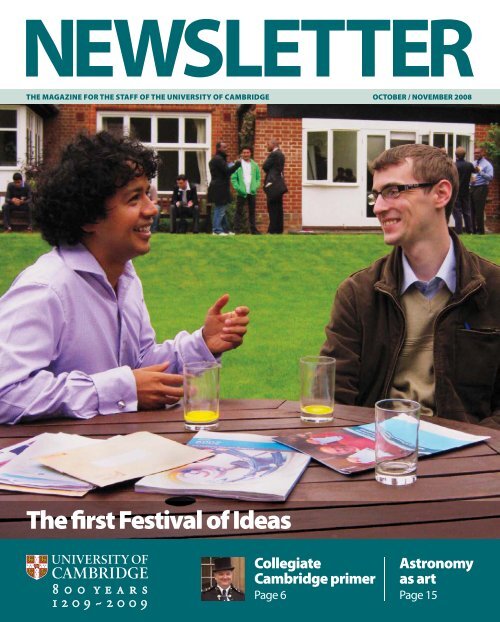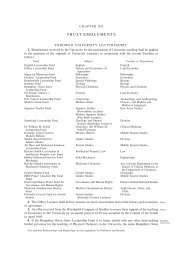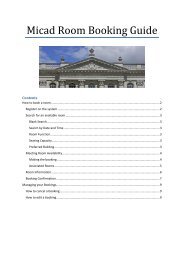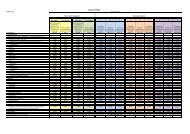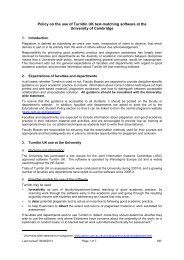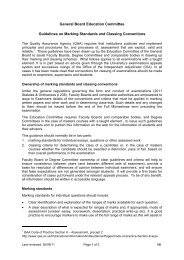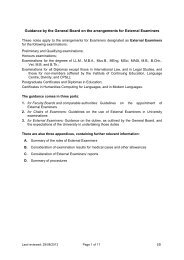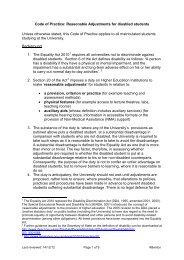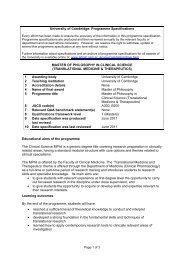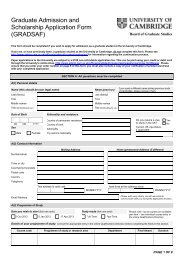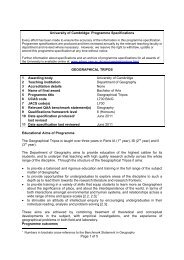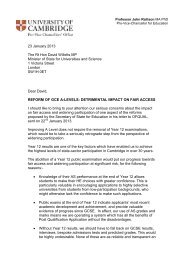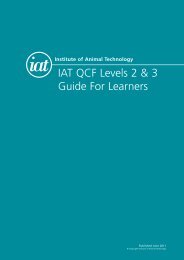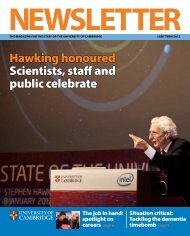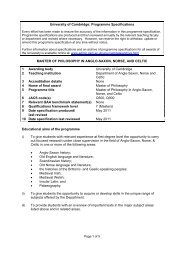oCTober / november - the University Offices - University of Cambridge
oCTober / november - the University Offices - University of Cambridge
oCTober / november - the University Offices - University of Cambridge
Create successful ePaper yourself
Turn your PDF publications into a flip-book with our unique Google optimized e-Paper software.
The mAgAzIne For The sTAFF oF The UnIversITy oF CAmbrIdge <strong>oCTober</strong> / <strong>november</strong> 2008<br />
The first Festival <strong>of</strong> Ideas<br />
Collegiate<br />
<strong>Cambridge</strong> primer<br />
Page 6<br />
Astronomy<br />
as art<br />
Page 15
A banner day Olympic swimmer Mark<br />
Foster launched <strong>the</strong> Bridge <strong>the</strong> Gap<br />
walk using a <strong>Cambridge</strong> <strong>University</strong><br />
flag on 14 September. The event<br />
attracted more than 2,000 walkers<br />
who raised funds for <strong>the</strong> Arthur Rank<br />
Charity Hospice, Teenage Cancer Trust<br />
Appeal and <strong>Cambridge</strong> Evening News’<br />
Press Relief charities. The 4.5-mile<br />
walk included 10 <strong>Cambridge</strong> Colleges.<br />
Community members were also invited<br />
inside Colleges on 13 September for<br />
<strong>the</strong> first Open <strong>Cambridge</strong> day.<br />
Looking ahead Pr<strong>of</strong>essor Janet Todd<br />
enjoyed a warm welcome from <strong>the</strong><br />
Fellows <strong>of</strong> Lucy Cavendish College<br />
when she was installed as <strong>the</strong> seventh<br />
President on 3 September. “There’s<br />
something quite wonderful about<br />
this College – a self-selected group<br />
<strong>of</strong> women from many disciplines,”<br />
she said. “It’s a rich environment for<br />
discussion and encounters, a fantastic<br />
opportunity to make something<br />
different, distinctive and intellectually<br />
exciting.”<br />
It all adds up Forty GCSE students<br />
from deprived areas in inner-city and<br />
Greater London took part in a oneweek<br />
intensive course in ma<strong>the</strong>matics<br />
at <strong>Cambridge</strong> in August. The<br />
residential course is part <strong>of</strong> a year-long<br />
programme which includes two more<br />
residential sessions and e-tutoring.<br />
The $1.2 million Fast Forward Maths<br />
programme, funded by <strong>the</strong> Goldman<br />
Sachs Foundation, targets groups<br />
who are under-represented in higher<br />
education.<br />
The wedding riddle The marriage <strong>of</strong><br />
Sir Winston Churchill and Clementine<br />
Hozier produced five children, lasted<br />
more than 50 years and only ended<br />
with Sir Winston’s death in January<br />
1965. Now, 100 years after <strong>the</strong>ir<br />
wedding, <strong>the</strong> Churchill Archives Centre<br />
at Churchill College has launched a<br />
fresh appeal for information about<br />
missing wedding reception photos<br />
Although a photographer was present,<br />
<strong>the</strong> photographs have all disappeared.<br />
k www.chu.cam.ac.uk/archives<br />
PHILIP MYNOTT<br />
PHILIP MYNOTT<br />
PHILIP MYNOTT<br />
Cover<br />
Conversations – exchanges <strong>of</strong> ideas<br />
– will be an important part <strong>of</strong> <strong>the</strong><br />
upcoming Festival <strong>of</strong> Ideas.<br />
Photo: Alex Buxton<br />
3–5<br />
What’s new<br />
6–7<br />
Inside <strong>the</strong> colleges<br />
Explaining <strong>the</strong> College and<br />
<strong>University</strong> relationship<br />
8–9<br />
Milestones<br />
<strong>Cambridge</strong> will host its first-ever<br />
Festival <strong>of</strong> Ideas this October<br />
10–11<br />
Making a difference<br />
Encouraging inter-faith conversations<br />
12<br />
People<br />
13<br />
Prizes, awards and honours<br />
14<br />
Advertisements<br />
15–16<br />
Back pages<br />
Using art to understand science<br />
The Newsletter is published for <strong>the</strong> staff <strong>of</strong> <strong>the</strong><br />
<strong>University</strong> <strong>of</strong> <strong>Cambridge</strong> and is produced by <strong>the</strong><br />
Office <strong>of</strong> External Affairs and Communications. Please<br />
send in ideas for <strong>the</strong> content and o<strong>the</strong>r ways we can<br />
improve <strong>the</strong> publication. Tel: (3)32300<br />
newsletter@admin.cam.ac.uk<br />
Suggestions for articles for <strong>the</strong> Dec/Jan edition<br />
should reach <strong>the</strong> Editor by 14 October.<br />
Editor: Susan Dalzell<br />
Designer: Richard Reeve Design<br />
Printers: <strong>Cambridge</strong> Printing<br />
Newsletter online<br />
www.admin.cam.ac.uk/univ/newsletter/<br />
2 | UNIVERSITY OF CAMBRIDGE Newsletter | OCTOBER / NOVEMBER 2008
Your comments and contributions are always welcome.<br />
Please send <strong>the</strong>m to <strong>the</strong> Editor at newsletter@admin.cam.ac.uk<br />
The deadline for <strong>the</strong> next issue is 14 October.<br />
Growing interest in<br />
Botanic Garden<br />
ALL NEW …<br />
800th book<br />
launched<br />
A new book and a final call for 2009<br />
Fund applications are on <strong>the</strong> agenda<br />
for <strong>the</strong> 800th celebrations this autumn.<br />
The <strong>University</strong> <strong>of</strong> <strong>Cambridge</strong>: An 800th<br />
Anniversary Portrait, was launched on<br />
26 September during Alumni Weekend.<br />
Published as <strong>the</strong> <strong>of</strong>ficial volume to<br />
accompany <strong>the</strong> 800th Anniversary<br />
celebrations, this hardback edition traces<br />
<strong>the</strong> <strong>University</strong>’s growth and development<br />
over <strong>the</strong> past eight centuries. The book<br />
will go on general sale in early November.<br />
Departments, Colleges and <strong>University</strong><br />
groups wishing to help celebrate <strong>the</strong><br />
800th Anniversary have one last chance<br />
to apply for funding. The final deadline for<br />
<strong>the</strong> 2009 Fund is 22 October.<br />
k www.cam.ac.uk/800<br />
Gardeners’ World host Tony Buckland visited <strong>the</strong> <strong>University</strong>’s Botanic Garden in September.<br />
Summer may have been a wash-out,<br />
but <strong>the</strong>re has been plenty blossoming<br />
at <strong>the</strong> <strong>University</strong>’s Botanic Garden.<br />
BBC TV crews were in attendance<br />
at <strong>the</strong> beginning <strong>of</strong> September to<br />
film Gardeners’ World’s new host Toby<br />
Buckland.<br />
Buckland, who replaced show<br />
stalwart Monty Don following his<br />
stroke, is a former Woodland Section<br />
Supervisor at <strong>the</strong> Botanic Garden. He<br />
came as a trainee before taking over<br />
<strong>the</strong> Woodland Section. For his first<br />
show in charge <strong>of</strong> Gardeners’ World,<br />
he returned to his former haunt to<br />
reminisce about his time <strong>the</strong>re.<br />
“I had a brilliant time here,” he said.<br />
“I made really good friends with <strong>the</strong><br />
people I worked with and found out an<br />
awful lot about plants and how to grow<br />
<strong>the</strong>m. What more could anyone want<br />
in a job?”<br />
But that’s not all; work is nearing<br />
completion on <strong>the</strong> new Brookside<br />
Gate at <strong>the</strong> corner <strong>of</strong> Bateman Street<br />
and Trumpington Road – which will<br />
become <strong>the</strong> principal public entrance<br />
for <strong>the</strong> Garden.<br />
Designed by local architects<br />
Saunders Boston, <strong>the</strong> new entrance<br />
will open up <strong>the</strong> Garden by revealing<br />
views into <strong>the</strong> heart <strong>of</strong> its stunning<br />
landscape. A new shop and wooden<br />
ticket kiosk were also commissioned as<br />
well as a new path alongside <strong>the</strong><br />
newly-turfed lawn.<br />
Meanwhile, <strong>the</strong> Experimental<br />
Section <strong>of</strong> <strong>the</strong> Garden have been<br />
working with two conservation<br />
organisations on research and<br />
reintroduction programmes.<br />
A thistle (Cirsium tuberosum) usually<br />
found on calcareous grassland and<br />
ploughed to near extinction, has<br />
been propagated for reintroduction<br />
at <strong>the</strong> National Trust’s Wimpole Estate.<br />
Work has also been undertaken on<br />
<strong>the</strong> Fen Orchid Liparis loeslii with <strong>the</strong><br />
plant conservation charity, Plantlife.<br />
The tiny orchid is in decline through<br />
most <strong>of</strong> Europe. The Garden hopes to<br />
grow orchids from seed to boost wild<br />
populations.<br />
k www.botanic.cam.ac.uk/<br />
k www.bbc.co.uk/gardenersworld<br />
True chemistry<br />
Inspect your<br />
gadgets<br />
No flash in <strong>the</strong> pan<br />
The Department <strong>of</strong> Chemical Engineering<br />
and <strong>the</strong> Institute <strong>of</strong> Biotechnology merged<br />
to form a single Department <strong>of</strong> Chemical<br />
Engineering and Biotechnology on<br />
1 August. The move builds upon <strong>the</strong><br />
strengths <strong>of</strong> both departments and<br />
increases cross-disciplinary research to<br />
address emerging global challenges.<br />
The merger took place after several years<br />
<strong>of</strong> close collaboration and discussion<br />
between <strong>the</strong> Department and <strong>the</strong> Institute<br />
and is expected to promote new research<br />
directions.<br />
k www.ceb.cam.ac.uk/<br />
The <strong>University</strong> Library has assembled a<br />
collection <strong>of</strong> gadgets, toolbars and o<strong>the</strong>r<br />
plug-ins that can operate alongside<br />
<strong>the</strong> Newton catalogue and electronic<br />
resources available to members <strong>of</strong> <strong>the</strong><br />
<strong>University</strong>. These include search plug-ins<br />
for iGoogle and Opensearch compatible<br />
browsers, such as Firefox and Internet<br />
Explorer, and a fully featured toolbar for<br />
Internet Explorer 7 and Firefox which<br />
allows you to conduct complex searches<br />
away from <strong>the</strong> catalogue interface.<br />
k http://ul-newton.lib.cam.ac.uk/help/<br />
web_tools.htm<br />
It’s been a busy year for chefs at Sidney<br />
Sussex College since winning <strong>the</strong><br />
<strong>Cambridge</strong> Colleges’ Chefs Competition<br />
last October. Head Chef Stephen Ma<strong>the</strong>r<br />
went on to win gold at <strong>the</strong> national<br />
competition in December and <strong>the</strong> junior<br />
chefs won gold at <strong>the</strong> Food Show at <strong>the</strong><br />
NEC in Birmingham. This year’s competition<br />
will see a record number <strong>of</strong> entries. The<br />
final takes place at Christ’s College on<br />
30 October.<br />
OCTOBER / NOVEMBER 2008 | UNIVERSITY OF CAMBRIDGE Newsletter | 3
Building a better rower<br />
RSD<br />
reorganises<br />
its services<br />
The drama <strong>of</strong> <strong>the</strong> seven-month<br />
build-up to <strong>the</strong> 2007 Boat Race is <strong>the</strong><br />
subject <strong>of</strong> a newly-published book by<br />
<strong>Cambridge</strong> academic Mark de Rond <strong>of</strong><br />
Judge Business School.<br />
De Rond spent <strong>the</strong> entire period<br />
embedded with <strong>Cambridge</strong> <strong>University</strong><br />
Boat Club (CUBC) from <strong>the</strong> first<br />
ga<strong>the</strong>ring for ‘ergo’ tests to select <strong>the</strong><br />
initial squad in September through to<br />
<strong>the</strong> race itself.<br />
A keen rower himself, he aimed to<br />
make an ethnographical study <strong>of</strong> <strong>the</strong><br />
world <strong>of</strong> <strong>the</strong> students who spend seven<br />
months combining <strong>the</strong>ir studies with<br />
a gruelling programme <strong>of</strong> training and<br />
selection. The goal is always to pick <strong>the</strong><br />
fastest boat possible to race Oxford on<br />
<strong>the</strong> Tideway in <strong>the</strong> spring.<br />
His book <strong>of</strong>fers real insight into<br />
what motivates and frustrates <strong>the</strong>se<br />
highly competitive athletes who<br />
are in direct competition with each<br />
o<strong>the</strong>r but must produce completely<br />
harmonious and efficient movement<br />
in <strong>the</strong> boat.<br />
“It’s an experimental book, and<br />
one written for a general audience,”<br />
De Rond says. “One <strong>of</strong> my objectives<br />
was to do justice to <strong>the</strong> visceral and<br />
highly emotional context <strong>of</strong> both<br />
<strong>Cambridge</strong> and Oxford rowing and<br />
ethnography – or <strong>the</strong> sort <strong>of</strong> stuff that<br />
<strong>of</strong>ten gets lost in academic writing.”<br />
The book has been well-received<br />
already, with former Oxford coach Dan<br />
Topolski writing in <strong>the</strong> Guardian: “De<br />
Rond succeeds in conjuring up <strong>the</strong> lives<br />
<strong>of</strong> athletes in extremis, under constant<br />
pressure to perform – and study.”<br />
k The Last Amateurs – To Hell and Back<br />
with <strong>the</strong> <strong>Cambridge</strong> Boat Race Crew<br />
(Icon Books, 2008, £17.99) is out now.<br />
Ethnologist Mark de Rond spent<br />
seven months shadowing CUBC<br />
rowers.<br />
Howard Guest<br />
Following a reorganisation<br />
<strong>of</strong> services in Research Services<br />
Division (RSD), each research grant<br />
is now supported by <strong>the</strong> same team<br />
throughout its lifecycle.<br />
“By providing services for individual<br />
research projects from cradle to<br />
grave, we can provide more efficient<br />
and personal interactions with<br />
academics, departments and external<br />
organisations alike,” says Edna Murphy,<br />
Deputy Director <strong>of</strong> RSD.<br />
The research grant lifecycle<br />
progresses from application stage to<br />
acceptance <strong>of</strong> <strong>the</strong> award, activation<br />
and administration <strong>of</strong> expenditure,<br />
and final closure. RSD staff help with<br />
applying for and securing funding,<br />
administering <strong>the</strong> grant, and <strong>of</strong>fering<br />
advice and assistance to researchers,<br />
research administrators and sponsors.<br />
The new teams are: a Life Sciences<br />
Team supporting <strong>the</strong> School <strong>of</strong><br />
Biological Sciences and <strong>the</strong> School <strong>of</strong><br />
Clinical Medicine; a Physical Sciences<br />
and Technology Team supporting<br />
<strong>the</strong> School <strong>of</strong> Physical Sciences and<br />
<strong>the</strong> School <strong>of</strong> Technology; and an<br />
Arts, Humanities and Social Sciences<br />
Team supporting <strong>the</strong> School <strong>of</strong> Arts<br />
and Humanities and <strong>the</strong> School <strong>of</strong><br />
Humanities and Social Sciences.<br />
RSD will provide researchers with<br />
<strong>the</strong> opportunity to meet a variety <strong>of</strong><br />
research sponsors when it hosts its<br />
annual Research Funding Roadshow on<br />
12 November from 10am to 3pm in <strong>the</strong><br />
<strong>University</strong> Centre. Attendees will learn<br />
more about how funding schemes<br />
work, current funding opportunities<br />
and ‘top tips’ for applying for <strong>the</strong>m, by<br />
meeting sponsor representatives in an<br />
informal and open setting.<br />
k For details, email rsd.enquiries@rsd.<br />
cam.ac.uk<br />
4 | UNIVERSITY OF CAMBRIDGE Newsletter | OCTOBER / NOVEMBER 2008
Pay a visit to <strong>the</strong> new interactive version <strong>of</strong> <strong>the</strong> online edition <strong>of</strong><br />
<strong>the</strong> Newsletter: www.admin.cam.ac.uk/univ/newsletter/<br />
Ordinary people,<br />
extraordinary portraits<br />
Lifeboatmen, nannies,<br />
vagrants, farmers and<br />
butchers are all perfectly<br />
at home in Girton<br />
College.<br />
That is, on <strong>the</strong> walls <strong>of</strong><br />
Girton College.<br />
A note-taker and a<br />
hairdresser joined <strong>the</strong><br />
College’s acclaimed<br />
People’s Portraits<br />
exhibition in September.<br />
The new portraits, both<br />
by members <strong>of</strong> <strong>the</strong><br />
Royal Society <strong>of</strong> Portrait<br />
Painters, bring <strong>the</strong><br />
collection up to a total <strong>of</strong><br />
40 paintings. The Chief<br />
Executive <strong>of</strong> <strong>the</strong> Royal<br />
Academy <strong>of</strong> Arts, Dr Charles Saumarez<br />
Smith, unveiled <strong>the</strong> paintings during<br />
a celebratory reception on 27<br />
September.<br />
On long-term loan to <strong>the</strong> College<br />
John McWilliam was painted by<br />
Benjamin Sullivan in 2007.<br />
Ringing in changes<br />
Shiny new phones have already<br />
made <strong>the</strong>ir way to more than 4,000<br />
<strong>University</strong> <strong>of</strong> <strong>Cambridge</strong> desks, with<br />
as many as 10,000 expected to be<br />
installed by December.<br />
The new handsets are part <strong>of</strong> <strong>the</strong><br />
first major overhaul <strong>of</strong> <strong>the</strong> <strong>University</strong><br />
Telephone Network in more than 20<br />
years. The new system uses Voice over<br />
Internet Protocol Technology and <strong>of</strong>fers<br />
numerous improved features, including<br />
voicemail messages delivered via email<br />
and caller ID display.<br />
The changeover, which is being<br />
completed one institution at a time,<br />
has been managed by a project team<br />
drawn from <strong>the</strong> <strong>University</strong> Computing<br />
Service, PTS Consulting, and BT iNET.<br />
“While <strong>the</strong> team itself has been<br />
highly successful in meeting <strong>the</strong><br />
since September 2002,<br />
People’s Portraits began<br />
life as a millennium<br />
exhibition mounted<br />
by <strong>the</strong> Royal Society <strong>of</strong><br />
Portrait Painters. The<br />
idea was to represent<br />
ordinary people from<br />
all walks <strong>of</strong> life, <strong>of</strong>fering<br />
a picture <strong>of</strong> <strong>the</strong> United<br />
Kingdom as it moved<br />
from <strong>the</strong> 20th century<br />
into <strong>the</strong> 21st.<br />
The new paintings<br />
are Girish Sethna,<br />
Note-Taker, by Alastair<br />
Adams, and The<br />
Hairdresser, by Saied<br />
Dai. They can be viewed<br />
daily from 2-4pm (additional times by<br />
prior arrangement) and families can<br />
request an activity pack.<br />
k www.girton.cam.ac.uk/about/<br />
peoples-portraits-exhibition<br />
schedule and budgetary targets, <strong>the</strong>re<br />
have been, as with any new system <strong>of</strong><br />
this size, some technical issues that are<br />
constantly being chased and resolved,”<br />
says Dr Jake Hornsby, Head <strong>of</strong> <strong>the</strong><br />
Network Division for UCS.<br />
Some new phone users may have<br />
had problems with <strong>the</strong> introduction<br />
<strong>of</strong> <strong>the</strong> new voicemail and call logging<br />
systems, but those issues should now<br />
be resolved. Production <strong>of</strong> institutional<br />
and individual self-service web pages<br />
for <strong>the</strong> billing system, however, have<br />
been slightly delayed due to <strong>the</strong> work<br />
needed to resolve <strong>the</strong> minor issues<br />
with <strong>the</strong> system.<br />
“We hope to accelerate <strong>the</strong> work on<br />
<strong>the</strong>se items and provide <strong>the</strong>m in due<br />
course,” says Dr Hornsby.<br />
k www.phone.cam.ac.uk<br />
ALL NEW …<br />
Montaigne<br />
himself<br />
Fresh look for<br />
Newsletter<br />
New Regius<br />
Pr<strong>of</strong>essor <strong>of</strong><br />
Modern History<br />
Holiday<br />
Playscheme<br />
The <strong>University</strong> Library is currently<br />
showcasing its impressive collection<br />
<strong>of</strong> material associated with <strong>the</strong> French<br />
Renaissance essayist Michel de Montaigne<br />
(1533-1592). The exhibition, My Booke<br />
and My Selfe: Michel de Montaigne 1533-<br />
1592, includes books owned by <strong>the</strong> writer<br />
himself and continues until 23 December.<br />
Included is a 17th century edition <strong>of</strong><br />
his Essais which belonged to Napoleon<br />
during his exile on St Helena, and copies<br />
owned by Ben Jonson and Jean-Jacques<br />
Rousseau. The most valuable book is<br />
Montaigne’s own copy <strong>of</strong> Lucretius’ De<br />
rerum natura (1563).<br />
k www.lib.cam.ac.uk/exhibitions/Montaigne<br />
The Newsletter’s design has been given a<br />
refreshment. The magazine’s colour palette<br />
has been revised to include <strong>Cambridge</strong><br />
Blue – that’s <strong>the</strong> tint insde this sidebar –<br />
and <strong>the</strong> font for both body text and sidebar<br />
has been changed to versions <strong>of</strong> Myriad.<br />
The redesign was completed by Richard<br />
Reeve Design using new Identity Guidelines<br />
compiled by <strong>the</strong> Communications Services<br />
team in <strong>the</strong> Office <strong>of</strong> External Affairs and<br />
Communications.<br />
k View <strong>the</strong> guidelines and download<br />
stationery and templates personalised for<br />
your department at www.admin.cam.ac.uk/<br />
<strong>of</strong>fices/communications/services/<br />
Richard J Evans, <strong>the</strong> eminent historian <strong>of</strong><br />
19th and 20th century Germany, takes up<br />
<strong>the</strong> post <strong>of</strong> Regius Pr<strong>of</strong>essor <strong>of</strong> Modern<br />
History this month. Pr<strong>of</strong>essor Evans, whose<br />
recent works include a three-volume<br />
history <strong>of</strong> <strong>the</strong> Third Reich, will be <strong>the</strong> 21st<br />
individual to hold <strong>the</strong> post, which was<br />
established by King George I in 1724 and<br />
is still appointed by <strong>the</strong> Crown. Pr<strong>of</strong>essor<br />
Evans is widely acknowledged as one <strong>of</strong><br />
<strong>the</strong> country’s foremost living historians.<br />
He replaces Pr<strong>of</strong>essor Quentin Skinner,<br />
who is retiring after a distinguished tenure<br />
<strong>of</strong> <strong>the</strong> Chair since 1996.<br />
<strong>University</strong> and College staff can book<br />
<strong>the</strong>ir children into an Autumn Half-<br />
Term Holiday Playscheme from 27 to<br />
31 <strong>of</strong> October. The Universities Holiday<br />
Playscheme is a joint operation between<br />
<strong>the</strong> <strong>University</strong> <strong>of</strong> <strong>Cambridge</strong> and Anglia<br />
Ruskin <strong>University</strong> for children <strong>of</strong> rising 5<br />
to 15 years. For booking forms and costs,<br />
visit <strong>the</strong> Childcare <strong>of</strong>fice website. Advance<br />
bookings will close on 17 October.<br />
k www.cam.ac.uk/staffstudents/childcare/<br />
playscheme/<br />
OCTOBER / NOVEMBER 2008 | UNIVERSITY OF CAMBRIDGE Newsletter | 5
While many <strong>of</strong> us realise <strong>the</strong>re is a complex relationship between Colleges and <strong>the</strong> wider <strong>University</strong>,<br />
<strong>the</strong> precise nature <strong>of</strong> <strong>the</strong> connection is not always understood. Here, we <strong>of</strong>fer staff a primer …<br />
Colleges and <strong>University</strong>:<br />
<strong>Cambridge</strong> is a multi-faceted,<br />
multi-layered structure that has<br />
developed organically over nearly<br />
eight centuries. Perhaps <strong>the</strong> easiest<br />
way <strong>of</strong> understanding it is to look at <strong>the</strong><br />
functions <strong>of</strong> <strong>the</strong> College and <strong>University</strong>,<br />
how <strong>the</strong>y differ and how <strong>the</strong>y overlap.<br />
Let’s start at <strong>the</strong> beginning <strong>of</strong> <strong>the</strong><br />
process, with admissions.<br />
Admissions<br />
<strong>Cambridge</strong> Colleges are free to<br />
select <strong>the</strong>ir own undergraduates for<br />
admission, subject to some minimum<br />
educational requirements set by <strong>the</strong><br />
<strong>University</strong>. Unlike o<strong>the</strong>r universities,<br />
where Faculties and Departments<br />
select undergraduates for admission,<br />
in <strong>Cambridge</strong> this responsibility is held<br />
within <strong>the</strong> Colleges – a recognition<br />
<strong>of</strong> <strong>the</strong>ir distinctive combination <strong>of</strong><br />
academic expertise and pastoral<br />
responsibility.<br />
For financial reasons, each College<br />
effectively has a target number <strong>of</strong><br />
‘home’ (UK and EU) undergraduates<br />
it can admit each year. (For medical<br />
students only, <strong>the</strong>re is a quota per<br />
College.) However, a College can, if it<br />
wishes, admit any number <strong>of</strong> ‘overseas’<br />
undergraduates.<br />
The admissions process for<br />
graduate students (those studying for<br />
a Masters or PhD) is a little different.<br />
A prospective graduate student must<br />
apply to and be accepted by a Faculty<br />
or Department <strong>of</strong> <strong>the</strong> <strong>University</strong>, a<br />
process handled by <strong>the</strong> Board <strong>of</strong><br />
Graduate Studies. At <strong>the</strong> same time,<br />
students can – and most do – indicate a<br />
preference for a College.<br />
Within <strong>the</strong> College, <strong>the</strong> Graduate<br />
Admissions Tutor makes <strong>the</strong> selection,<br />
from what is a large and international<br />
field <strong>of</strong> graduate applicants.<br />
Teaching<br />
For undergraduates, lectures – and,<br />
in science subjects, practicals – are<br />
provided centrally, by <strong>the</strong> <strong>University</strong>,<br />
and take place in <strong>the</strong> Faculties,<br />
Departments and o<strong>the</strong>r lecture<br />
facilities dotted around <strong>Cambridge</strong>.<br />
By contrast, supervisions – <strong>the</strong><br />
individual or small-group tutorials that<br />
are <strong>the</strong> gold standard <strong>of</strong> a <strong>Cambridge</strong><br />
undergraduate education – are<br />
arranged and paid for by <strong>the</strong> College.<br />
They are usually carried out by a Fellow<br />
or o<strong>the</strong>r College member, <strong>of</strong>ten in his/<br />
her College room. (Swap arrangements<br />
between Colleges exist for small<br />
subjects and specialisms in which it is<br />
impractical for every College to have its<br />
own teaching Fellow.)<br />
Most <strong>of</strong> <strong>the</strong> College Fellows<br />
who direct studies or supervise<br />
undergraduates also hold <strong>University</strong><br />
posts (lectureships, readerships,<br />
pr<strong>of</strong>essorships). In financial terms,<br />
this means that <strong>the</strong> <strong>University</strong> pays<br />
<strong>the</strong> major proportion <strong>of</strong> <strong>the</strong>ir salaries,<br />
although <strong>the</strong> College pays for<br />
supervisions.<br />
Most Colleges also employ some<br />
College Teaching Officers (CTOs) –<br />
whose salaries are paid entirely by<br />
<strong>the</strong> College – to supervise and direct<br />
studies in subjects where demand<br />
exceeds <strong>the</strong> supply <strong>of</strong> academics with<br />
<strong>University</strong> positions.<br />
These CTOs and some <strong>University</strong><br />
Teaching Officer (UTO) Fellows also<br />
bring <strong>the</strong>ir expertise to some <strong>of</strong> <strong>the</strong><br />
o<strong>the</strong>r roles (Tutor, Admissions Tutor,<br />
etc.) that are essential to <strong>the</strong> working <strong>of</strong><br />
<strong>the</strong> College as a residential community<br />
<strong>of</strong>fering pastoral as well as academic<br />
support.<br />
The formal teaching <strong>of</strong> graduate<br />
students is <strong>the</strong> responsibility <strong>of</strong><br />
<strong>the</strong> Faculties and Departments,<br />
but Colleges also provide valuable,<br />
informal academic benefits for<br />
graduates, <strong>of</strong>fering <strong>the</strong>m a peer<br />
support network, a forum in which to<br />
present new research, and <strong>the</strong> chance<br />
to develop teaching expertise through<br />
supervisions.<br />
Research<br />
Most research in <strong>Cambridge</strong> is carried<br />
The collegiate<br />
structure is<br />
central to<br />
<strong>Cambridge</strong>’s<br />
success and<br />
provides an<br />
environment<br />
for generations<br />
and academic<br />
disciplines to<br />
mix freely<br />
out in <strong>the</strong> Faculties and Departments,<br />
and is funded by <strong>the</strong> <strong>University</strong> via<br />
grants from HEFCE and <strong>the</strong> various<br />
government Research Councils. Junior<br />
Research Fellowships in <strong>the</strong> Colleges<br />
are a notable exception. These are<br />
three-year positions, paid for by <strong>the</strong><br />
College, which <strong>of</strong>fer talented young<br />
academics <strong>the</strong> chance to devote<br />
<strong>the</strong>mselves to research without<br />
significant teaching or administrative<br />
duties. They are <strong>the</strong> Colleges’ unique<br />
contribution to research excellence.<br />
Facilities and pastoral support<br />
For undergraduate and graduate<br />
students alike, <strong>the</strong> College provides<br />
key facilities: libraries and computer<br />
rooms; accommodation and catering;<br />
common rooms and bars; sporting,<br />
musical and artistic facilities; and,<br />
not least, individual pastoral support<br />
through <strong>the</strong> tutorial system. This last<br />
is a central and distinctive feature <strong>of</strong><br />
6 | UNIVERSITY OF CAMBRIDGE Newsletter | october / <strong>november</strong> 2008
a complex relationship<br />
DID YOU KNOW?<br />
l <strong>Cambridge</strong> has 31 Colleges. The<br />
first <strong>Cambridge</strong> College, Peterhouse,<br />
was founded by <strong>the</strong> Bishop <strong>of</strong><br />
Ely in 1284. None were founded<br />
between 1596 (Sidney Sussex) and<br />
1800 (Downing). Robinson College,<br />
founded in 1979, was <strong>the</strong> most<br />
recent College established. However,<br />
Hughes Hall, which was founded in<br />
1885, received full <strong>University</strong> College<br />
status in April 2007.<br />
<strong>the</strong> collegiate system, and is a major<br />
reason for <strong>the</strong> academic success <strong>of</strong> our<br />
students and <strong>Cambridge</strong>’s extremely<br />
low drop-out rate. The <strong>University</strong>,<br />
too, provides academic and cultural<br />
facilities for all <strong>Cambridge</strong> students.<br />
Never<strong>the</strong>less, for most undergraduates,<br />
College will be <strong>the</strong>ir ‘home’ during <strong>the</strong>ir<br />
time at <strong>Cambridge</strong>.<br />
Graduation<br />
On successful conclusion <strong>of</strong> <strong>the</strong>ir<br />
studies, <strong>the</strong> Colleges present <strong>the</strong>ir<br />
students to <strong>the</strong> <strong>University</strong>, which<br />
confers <strong>the</strong>ir degrees. They remain<br />
members <strong>of</strong> both College and<br />
<strong>University</strong> for life.<br />
The genius <strong>of</strong> scale<br />
Given <strong>the</strong> complexity <strong>of</strong> <strong>the</strong> <strong>University</strong>–<br />
College relationship, would it not be<br />
better, some ask, if <strong>Cambridge</strong> simply<br />
centralised everything and <strong>the</strong> Colleges<br />
became mere halls <strong>of</strong> residence? Not<br />
if <strong>Cambridge</strong> wants to remain in <strong>the</strong><br />
top rank <strong>of</strong> universities worldwide, for<br />
<strong>the</strong> collegiate structure is central to<br />
<strong>Cambridge</strong>’s success.<br />
Because <strong>of</strong> <strong>the</strong> small-scale nature<br />
<strong>of</strong> <strong>the</strong> College community and <strong>the</strong><br />
loyalty it inspires among its Fellows,<br />
undergraduates benefit from<br />
teaching by world-class researchers, a<br />
situation highly unusual in <strong>the</strong> leading<br />
research universities. College-based<br />
supervisions encourage intellectual<br />
rigour, freedom <strong>of</strong> thought, learning<br />
and debate.<br />
In <strong>the</strong> Colleges, generations and<br />
academic disciplines mix freely.<br />
Students and Fellows experience<br />
<strong>the</strong> breadth and excellence <strong>of</strong> a top<br />
<strong>University</strong> at an intimate level. The Vice-<br />
Chancellor calls it <strong>the</strong> ‘genius <strong>of</strong> scale’.<br />
k This article was originally published in<br />
Clare News, <strong>the</strong> bi-annual newsletter <strong>of</strong><br />
Clare College.<br />
<strong>University</strong> Constables ga<strong>the</strong>r<br />
inside Clare College’s Old Court<br />
prior to <strong>the</strong> 2007 <strong>University</strong><br />
Honorary Degree ceremony.<br />
NIGEL LUCKHURST<br />
l Each College is an autonomous<br />
corporation and internal procedures<br />
vary. Like <strong>the</strong> <strong>University</strong>, each College<br />
is governed by its own statutes<br />
and regulations. The elected or<br />
appointed Head <strong>of</strong> a College may be<br />
termed Master, President, Principal,<br />
Mistress, Provost or Warden. The<br />
Governing Body is made up <strong>of</strong> <strong>the</strong><br />
Head and some or all <strong>of</strong> <strong>the</strong> Fellows<br />
– <strong>the</strong> elected senior members <strong>of</strong><br />
<strong>the</strong> College whose primary duty is<br />
teaching, administration or research.<br />
l From <strong>the</strong> early 16th century,<br />
most elected Vice-Chancellors<br />
were already Heads <strong>of</strong> Colleges<br />
within <strong>the</strong> <strong>University</strong>, and from<br />
1587 to 1992 all were. In 1992, <strong>the</strong><br />
role <strong>of</strong> Vice-Chancellor became a<br />
full-time position.<br />
LEARN MORE<br />
For more details on <strong>the</strong> relationship<br />
between Colleges and <strong>the</strong> <strong>University</strong>,<br />
visit:<br />
k www.cam.ac.uk/univ/works/<br />
colleges.html<br />
k www.cam.ac.uk/univ/history/<br />
k www.800.cam.ac.uk/page/<br />
168/800-years-<strong>of</strong>-history.htm<br />
OCTOBER / NOVEMBER 2008 | UNIVERSITY OF CAMBRIDGE Newsletter | 7
Arts, humanities and social sciences will take centre stage when <strong>the</strong> <strong>University</strong> holds its first-ever<br />
Festival <strong>of</strong> Ideas later this month. From 22 October to 2 November, more than 200 events will be<br />
held for people <strong>of</strong> all ages at venues throughout <strong>Cambridge</strong>. Read on for an idea <strong>of</strong> what to expect<br />
A bright idea<br />
PHOTOS BY PHILLIP MYNOTT<br />
As one <strong>of</strong> a huge range <strong>of</strong><br />
academics taking part in <strong>Cambridge</strong>’s<br />
first Festival <strong>of</strong> Ideas, social<br />
anthropologist Dr Kathleen Richardson<br />
sees <strong>the</strong> value in sharing research with<br />
a broader audience.<br />
“It isn’t always obvious how one’s<br />
research is ‘relevant,’ ‘interesting’ and<br />
‘exciting’ to those o<strong>the</strong>r than colleagues<br />
in <strong>the</strong> field,” she says, “but encouraging<br />
academics to showcase <strong>the</strong>ir ideas to<br />
public audiences encourages new ways<br />
<strong>of</strong> thinking about one’s subject.”<br />
The aim <strong>of</strong> <strong>the</strong> free festival, taking<br />
place 22 October to 2 November, is<br />
to reach out to people <strong>of</strong> all ages and<br />
let <strong>the</strong>m know about all <strong>the</strong> work<br />
being done at <strong>the</strong> <strong>University</strong> in <strong>the</strong><br />
arts, humanities and social sciences.<br />
Dr Richardson’s session on Facebook<br />
and social interactions is just one in<br />
a packed Festival schedule which<br />
includes workshops, performances,<br />
debates and lectures by well-known<br />
figures such as <strong>the</strong> BBC’s Evan Davis,<br />
Michael Howard MP and Doug Richard<br />
<strong>of</strong> Dragon’s Den.<br />
Nicola Buckley, <strong>the</strong> Festival’s<br />
coordinator, says it evolved out <strong>of</strong><br />
<strong>the</strong> successful Science Festival, held<br />
annually at <strong>the</strong> <strong>University</strong>. Buckley says<br />
it was “fairly natural that <strong>the</strong>se subjects<br />
should raise <strong>the</strong>ir pr<strong>of</strong>ile,” particularly<br />
since <strong>Cambridge</strong> has become<br />
increasingly associated with science<br />
and technology in <strong>the</strong> public’s mind<br />
in recent years. She adds that when<br />
<strong>the</strong> Science Festival started in 1995<br />
The packed<br />
Festival<br />
schedule<br />
includes<br />
workshops,<br />
performances,<br />
debates and<br />
lectures<br />
The Festival <strong>of</strong> Ideas is<br />
targeted to all age groups,<br />
but children will be especially<br />
welcome for Family Day<br />
activities on 25 October.<br />
<strong>the</strong>re were concerns about <strong>the</strong> lack <strong>of</strong><br />
students wanting to study physics and<br />
engineering. There are similar concerns<br />
today for subjects such as Modern<br />
Languages and <strong>the</strong> Classics.<br />
To determine what a Festival <strong>of</strong><br />
Ideas could include and how it would<br />
be funded, meetings were held with<br />
<strong>the</strong> Chairs within both <strong>the</strong> School <strong>of</strong><br />
Arts and Humanities and <strong>the</strong> School<br />
<strong>of</strong> Humanities and Social Sciences<br />
as well as with external funders. The<br />
Higher Education Funding Council for<br />
England’s Innovation Fund has agreed<br />
to provide core funding for <strong>the</strong> first<br />
three years and <strong>Cambridge</strong> <strong>University</strong><br />
Press is also contributing. Fur<strong>the</strong>r<br />
sponsorship is being sought.<br />
Every arts, humanities and<br />
social sciences department and <strong>the</strong><br />
<strong>University</strong>’s museums were challenged<br />
to come up with an event. Many events<br />
will take place at <strong>the</strong> Sidgwick Site, but<br />
<strong>the</strong>y also will be spread across <strong>the</strong> city.<br />
The first Saturday — 25 October — will<br />
be a Family Day with scores <strong>of</strong> activities<br />
for children on <strong>of</strong>fer, including poetry<br />
readings and a drumming workshop.<br />
Outreach work is also being done with<br />
schools and <strong>the</strong>re are competitions<br />
lined up for <strong>the</strong> Festival website.<br />
“The Festival is a wonderful<br />
opportunity to show <strong>the</strong> strength<br />
<strong>of</strong> <strong>Cambridge</strong>’s research in <strong>the</strong> arts,<br />
humanities and social sciences and<br />
<strong>the</strong> way that <strong>the</strong>se disciplines enrich<br />
and change our lives,” says Pr<strong>of</strong>essor<br />
Richard Hunter, Chair <strong>of</strong> <strong>the</strong> School <strong>of</strong><br />
Arts and Humanities. “It is also a timely<br />
reminder <strong>of</strong> how this research does not<br />
just take place within <strong>the</strong> confines <strong>of</strong><br />
<strong>the</strong> <strong>University</strong> but both draws on, and<br />
in turn gives back to, <strong>the</strong> societies all<br />
around us. I think that even <strong>University</strong><br />
staff will be surprised at <strong>the</strong> breadth <strong>of</strong><br />
what goes on.”<br />
k www.cambridgefestival<strong>of</strong>ideas.org<br />
8 | UNIVERSITY OF CAMBRIDGE Newsletter | october / <strong>november</strong> 2008
SPOTLIGHT ON:<br />
PRE-HISTORY DAY<br />
25 October, 10.30am to 4pm,<br />
34 A&B Storey’s Way<br />
If you liked watching <strong>the</strong> javelin at <strong>the</strong><br />
Olympics, why not take part in <strong>the</strong><br />
real thing? <strong>Cambridge</strong> Archaeological<br />
Unit is holding a Pre-History Day. As<br />
part <strong>of</strong> <strong>the</strong> day, Dr Tony Legge has<br />
<strong>of</strong>fered to make a ‘spear thrower,’<br />
which our prehistoric ancestors used as a kind <strong>of</strong> arm extension to gain greater<br />
leverage when hunting. Dr Legge will make some straw animal targets and<br />
demonstrate <strong>the</strong> spear thrower’s use. Visitors will also be able to have a go<br />
using bamboo garden poles as spears. Those taking part can experience o<strong>the</strong>r<br />
aspects <strong>of</strong> <strong>the</strong> lives <strong>of</strong> our prehistoric ancestors. They can learn about food with<br />
demonstrations <strong>of</strong> stone-age cooking techniques, watch pottery firing and<br />
metal smelting using ancient kiln techniques, dig in an archaeological test pit<br />
and test <strong>the</strong>ir archery skills.<br />
SPOTLIGHT ON:<br />
FACEBOOK<br />
25 October, 6:30 to 8pm,<br />
Michaelhouse Centre<br />
Have Facebook and o<strong>the</strong>r social<br />
networking sites led to people having<br />
less intimate friendships? There<br />
is a popular assumption that <strong>the</strong><br />
more people communicate through<br />
computerised technology, <strong>the</strong> less social<br />
<strong>the</strong>y are. Young people in particular are<br />
thought to lack social skills and experience because <strong>the</strong>y are all locked up with<br />
computers in <strong>the</strong> home. It’s an interesting paradox — we socialise through new<br />
technologies but are considered less social — and one which will be explored at<br />
this event. Hosted by social anthropologist Dr Kathleen Richardson, those taking<br />
part are Meg Pickard, Head <strong>of</strong> User Experience at <strong>the</strong> Guardian, Chris Lock, head <strong>of</strong><br />
European mobile at AOL, Sue Hessey, Principal Research Pr<strong>of</strong>essional at BT Group<br />
and Dr David Good from <strong>the</strong> Faculty <strong>of</strong> Social and Political Sciences.<br />
SPOTLIGHT ON:<br />
value <strong>of</strong> arts?<br />
23 October, 7 to 8.30 pm,<br />
McCrum Lecture Theatre<br />
Do we need any more arts graduates?<br />
Shouldn’t universities focus instead<br />
on vocational courses tailored to <strong>the</strong><br />
needs <strong>of</strong> <strong>the</strong> economy? These issues will<br />
be explored in a wide-ranging debate<br />
about <strong>the</strong> purpose <strong>of</strong> studying <strong>the</strong> arts,<br />
humanities and social sciences. City <strong>University</strong> Pr<strong>of</strong>essor <strong>of</strong> Journalism Adrian<br />
Monck says: “The skills that will build our future don’t come from literary study <strong>of</strong><br />
<strong>the</strong> arts. Students won’t thank us when <strong>the</strong>y’re <strong>the</strong>n unable to pay <strong>of</strong>f loans, but<br />
are asked to rely on <strong>the</strong> consolation <strong>of</strong> philosophy.” Philosopher Julian Baggini<br />
responds that philosophy is necessary in many areas <strong>of</strong> life and that “a lot <strong>of</strong><br />
philosophy is worth doing for its own sake and needs no o<strong>the</strong>r justification.” O<strong>the</strong>r<br />
speakers are Pr<strong>of</strong>essor John Carey, author <strong>of</strong> What Good are <strong>the</strong> Arts?, and Claire<br />
Fox, Director <strong>of</strong> <strong>the</strong> Institute <strong>of</strong> Ideas.<br />
Festival highlights<br />
For a complete listing <strong>of</strong> events, visit<br />
www.cambridgefestival<strong>of</strong>ideas.org<br />
22 October<br />
Press freedom in <strong>the</strong> Internet age<br />
7-7.45pm, Babbage Lecture Theatre John Naughton,<br />
Director <strong>of</strong> <strong>the</strong> Wolfson Press Fellowship Programme, chairs.<br />
Panellists: Agnes Callamard, Head <strong>of</strong> Article 19, on <strong>the</strong> major<br />
challenges for press freedom in <strong>the</strong> world today; Gerry Gable,<br />
Editor <strong>of</strong> Searchlight, on hate speech in <strong>the</strong> UK today; Rhidian<br />
Wynn-Davies <strong>of</strong> <strong>the</strong> Telegraph on <strong>the</strong> impact <strong>of</strong> <strong>the</strong> Internet<br />
on press freedom; and Pr<strong>of</strong>essor James Curran, co-author <strong>of</strong><br />
Power without Responsibility, on media and democracy in <strong>the</strong><br />
Internet age.<br />
23 October<br />
Jewish/Christian/Muslim relations<br />
5.30-6.30pm, Mill Lane Room 4 Dr Edward Kessler,<br />
Director <strong>of</strong> <strong>the</strong> Woolf Institute <strong>of</strong> Abrahamic Faiths, and<br />
Shaykh Michael Mumisa, Lecturer, Centre for <strong>the</strong> Study <strong>of</strong><br />
Muslim-Jewish Relations, discuss interfaith relations.<br />
24 October<br />
<strong>Cambridge</strong> thinkers<br />
5-5:30pm, Judge Business School Pr<strong>of</strong>essor <strong>of</strong><br />
Anthropological Science Alan Macfarlane on <strong>Cambridge</strong>’s<br />
role in shaping <strong>the</strong> history <strong>of</strong> ideas.<br />
The arts mean business<br />
6-7.15pm, Judge Business School Pr<strong>of</strong>essor Evelyn Welch,<br />
Director <strong>of</strong> <strong>the</strong> Arts and Humanities Research Council project<br />
Beyond Text, chairs. Panellists: Doug Richard, ex-Dragon’s<br />
Den, on creative uses <strong>of</strong> technology in fields such as digital<br />
music and new media; Dr Jennifer Barnes, new President <strong>of</strong><br />
Murray Edwards College and ex-Director <strong>of</strong> Education at BP,<br />
on music; John Quick <strong>of</strong> Royal Holloway on an innovative<br />
new media project; and Tim Jones, Head <strong>of</strong> City Life, on social<br />
enterprise.<br />
25 October, Family Day<br />
How to illuminate an elephant<br />
10:30-11.30am, Lady Mitchell Hall, Sidgwick Site<br />
Dr Christopher de Hamel, international expert on illuminated<br />
manuscripts, reveals <strong>the</strong> secrets <strong>of</strong> how illuminated<br />
manuscripts were designed and made.<br />
Can texting make you more literate?<br />
2:30-3.30pm , Lady Mitchell Hall Pr<strong>of</strong>essor David Crystal<br />
on whe<strong>the</strong>r texting is destroying literacy.<br />
27 October<br />
The limits <strong>of</strong> European integration<br />
5:30-6:30pm, <strong>University</strong> Centre Dr Julie Smith, Deputy<br />
Director <strong>of</strong> <strong>the</strong> Centre for International Studies, <strong>Cambridge</strong>,<br />
chairs. Panellists: Michael Howard MP; Vince Cable MP; and<br />
Stephen Wall, ex-British ambassador to <strong>the</strong> EU.<br />
Why study economics?<br />
5:30-6:30pm, Mill Lane Room 4 Panellists: Evan Davis,<br />
BBC, on five things people should know about economics;<br />
Pr<strong>of</strong>essor Willy Brown, Faculty <strong>of</strong> Economics, on <strong>the</strong><br />
minimum wage; and Mike Kitson, <strong>University</strong> Lecturer<br />
in International Macroeconomics, on <strong>the</strong> relevance <strong>of</strong><br />
economics to everyday life.<br />
PHOTOS BY PHILIP MYNOTT<br />
OCTOBER / NOVEMBER 2008 | UNIVERSITY OF CAMBRIDGE Newsletter | 9
<strong>Cambridge</strong>’s Inter-Faith Programme (CIP) is taking <strong>the</strong> lead in getting <strong>the</strong> world’s religious leaders<br />
talking to one ano<strong>the</strong>r<br />
Keeping <strong>the</strong> faith<br />
As <strong>the</strong> plane touched down at JFK<br />
Airport this July, Pr<strong>of</strong>essor David Ford<br />
braced himself for <strong>the</strong> usual queue<br />
at immigration. He was, after all, a<br />
European trying to enter <strong>the</strong> United<br />
States – a process which usually takes<br />
at least 45 minutes.<br />
Not even in <strong>the</strong>se days <strong>of</strong> stringent<br />
security, however, had <strong>the</strong> <strong>Cambridge</strong><br />
<strong>University</strong> Regius Pr<strong>of</strong>essor <strong>of</strong><br />
Divinity expected to receive personal<br />
attention. Before anyone was allowed<br />
to disembark a call went out for him<br />
to report to <strong>the</strong> crew. When he did, an<br />
armed homeland security <strong>of</strong>ficer (an<br />
Arabic speaker) took charge <strong>of</strong> him and<br />
whisked him past <strong>the</strong> queues en route<br />
to Yale <strong>University</strong>.<br />
Ford was on his way to <strong>the</strong> first<br />
in a series <strong>of</strong> conferences entitled<br />
A Common Word – an international<br />
ga<strong>the</strong>ring <strong>of</strong> Christian and Muslim<br />
scholars and religious leaders. With<br />
assorted prominent Sunni and Shi’ite<br />
Muslims flying into <strong>the</strong> US, Yale had<br />
arranged for each visitor to be met<br />
on entry. However, <strong>the</strong>y could not be<br />
seen to be discriminating in favour <strong>of</strong><br />
<strong>the</strong> Muslim participants; hence Ford’s<br />
personal escort. It was, he observes, <strong>the</strong><br />
fastest he has ever got into <strong>the</strong> country.<br />
As Director <strong>of</strong> <strong>Cambridge</strong>’s Inter-<br />
Faith Programme (CIP), Ford is used<br />
to <strong>the</strong>se slightly surreal episodes.<br />
Over <strong>the</strong> past couple <strong>of</strong> years, he has<br />
intermittently rubbed shoulders with<br />
Princes, Prime Ministers, Grand Muftis<br />
and <strong>the</strong> Archbishop <strong>of</strong> Canterbury – or<br />
“Rowan”, as he refers to him, since <strong>the</strong>y<br />
are on first name terms, having studied<br />
<strong>the</strong>ology toge<strong>the</strong>r in <strong>Cambridge</strong> as<br />
students. The ra<strong>the</strong>r chaotic state <strong>of</strong><br />
his <strong>of</strong>fice, with its heaps <strong>of</strong> paper and<br />
piles <strong>of</strong> religious reference books,<br />
belies <strong>the</strong> significance and scale <strong>of</strong> <strong>the</strong><br />
international projects with which he is<br />
involved.<br />
Based within <strong>the</strong> Faculty <strong>of</strong> Divinity,<br />
<strong>the</strong> <strong>Cambridge</strong> Inter-Faith Programme<br />
aims to foster discussion, research and<br />
understanding among people <strong>of</strong> all<br />
religions through study and mutual<br />
“We want to<br />
make sure our<br />
work relates<br />
to <strong>the</strong> world<br />
out <strong>the</strong>re”<br />
Pr<strong>of</strong>essor David Ford greets<br />
Ali Gomaa, <strong>the</strong> Grand Mufti<br />
<strong>of</strong> Egypt. As Director <strong>of</strong><br />
<strong>Cambridge</strong>’s Inter-Faith<br />
Programme (CIP),<br />
Pr<strong>of</strong>essor Ford <strong>of</strong>ten<br />
meets with spirtual<br />
leaders from<br />
around <strong>the</strong><br />
world.<br />
engagement – in particular between<br />
<strong>the</strong> three Abrahamic Faiths: Islam,<br />
Judaism and Christianity. This month<br />
it will host <strong>the</strong> second Common Word<br />
conference at Jesus College – <strong>the</strong><br />
follow-up to <strong>the</strong> Yale event in July.<br />
Archbishop Rowan Williams and Ali<br />
Gomaa, <strong>the</strong> Grand Mufti <strong>of</strong> Egypt,<br />
are among <strong>the</strong> dozens <strong>of</strong> eminent<br />
<strong>the</strong>ologians and religious leaders<br />
expected to attend.<br />
The conferences aim to keep alive a<br />
flurry <strong>of</strong> dialogue and action between<br />
on <strong>the</strong> horizon for cip<br />
In 2005, <strong>the</strong> <strong>Cambridge</strong> Inter-Faith Programme (CIP) received funding from <strong>the</strong> Coexist<br />
Foundation – a charity promoting better understanding between Jews, Christians and Muslims<br />
– for a three-year study into <strong>the</strong> feasibility <strong>of</strong> two new projects. Both have now been given <strong>the</strong><br />
go-ahead.<br />
The first is to be a new research programme within CIP itself, meaning that in <strong>the</strong> coming<br />
months it will take on more staff and formulate new research projects designed to benefit<br />
<strong>the</strong> understanding and wider collaboration <strong>of</strong> faiths. Public education projects will also be<br />
devised, in liaison with <strong>the</strong> <strong>University</strong>’s Institute for Continuing Education, and fundraising<br />
will begin for a directorship <strong>of</strong> public education.<br />
The second project will see CIP collaborate with <strong>the</strong> Coexist Foundation and o<strong>the</strong>r<br />
partners in seeking to establish a new public education centre in London, with <strong>the</strong><br />
provisional name <strong>of</strong> Abraham House. This is envisaged as a space which will host<br />
exhibitions, workshops, seminars, programmes, public performances, live debates, <strong>the</strong><br />
publication <strong>of</strong> books, resources for schools and more. All will seek to deepen public<br />
understanding <strong>of</strong> <strong>the</strong> Abrahamic religions. CIP will provide much <strong>of</strong> <strong>the</strong> educational<br />
input, ensuring that what happens in its research projects and seminars here at<br />
<strong>Cambridge</strong> flows directly into public learning programmes and community action.<br />
CIP’s Director David Ford is mindful <strong>of</strong> <strong>the</strong> dangers which accompany this breadth <strong>of</strong><br />
ambition. “We have to do it a step at a time and we don’t want to get overblown,” he says.<br />
“The working out <strong>of</strong> that whole programme and agenda is under way. Our priority now<br />
is to make sure we deal with <strong>the</strong> sort <strong>of</strong> issues to which <strong>Cambridge</strong> academics can make a<br />
serious contribution.”<br />
10 | UNIVERSITY OF CAMBRIDGE Newsletter | OCTOBER / NOVEMBER 2008
For more stories about breakthroughs in <strong>the</strong> sciences and <strong>the</strong> arts<br />
by <strong>Cambridge</strong> researchers go to www.admin.cam.ac.uk/news<br />
Christian and Muslim leaders which<br />
began with “A Common Word between<br />
Us and You”, a letter from 138 Islamic<br />
scholars, clerics and intellectuals,<br />
published a year ago. It was essentially<br />
a statement <strong>of</strong> peace and friendship<br />
to Christian leaders, in which <strong>the</strong><br />
signatories stated that one thing both<br />
religions have in common is love <strong>of</strong><br />
God and love <strong>of</strong> neighbour.<br />
Ford called it an “historic” template<br />
for future relations, “an astonishing<br />
achievement <strong>of</strong> solidarity” and<br />
“what we have been missing since<br />
September 11”. As <strong>the</strong> hosting <strong>of</strong> <strong>the</strong><br />
event at Jesus this month suggests,<br />
he has been deeply involved with<br />
developing its good work ever since.<br />
He was a signatory <strong>of</strong> <strong>the</strong> Christian<br />
response, published as a full page<br />
advertisement in <strong>the</strong> New York Times,<br />
which helped set in motion <strong>the</strong> series<br />
<strong>of</strong> discussions and<br />
conferences<br />
now under<br />
way. He<br />
was also<br />
consulted with o<strong>the</strong>rs from many<br />
universities and churches before <strong>the</strong><br />
Archbishop <strong>of</strong> Canterbury sent a<br />
substantial personal reply in July, which<br />
stressed <strong>the</strong> need for both religions to<br />
work toge<strong>the</strong>r for <strong>the</strong> common good<br />
<strong>of</strong> society.<br />
How Christians and Muslims<br />
should do that, while accepting <strong>the</strong>ir<br />
differences as well as <strong>the</strong>ir mutual<br />
foundations, is what <strong>the</strong> conference<br />
in <strong>Cambridge</strong> is about. Two more<br />
conferences are expected to follow<br />
– at Georgetown and in Jordan – in<br />
<strong>the</strong> coming months. “To use Rowan’s<br />
terminology, <strong>the</strong> aim is to set out a way<br />
<strong>of</strong> going forward side by side in relation<br />
to <strong>the</strong> rest <strong>of</strong> <strong>the</strong> world,” Ford says.<br />
Perhaps it seems a little surprising<br />
to find a <strong>Cambridge</strong> Divinity Pr<strong>of</strong>essor<br />
in <strong>the</strong> thick <strong>of</strong> this. Consider, though,<br />
that <strong>the</strong>ology is one <strong>of</strong> <strong>the</strong> few subjects<br />
to have been taught at <strong>the</strong> <strong>University</strong><br />
since its foundation nearly 800 years<br />
ago. For centuries, Ford’s predecessors<br />
have wrestled with <strong>the</strong> <strong>the</strong>ological<br />
challenges <strong>of</strong> contemporary society.<br />
His own generation is no different<br />
– hence CIP’s explicit aim to foster<br />
understanding between faiths.<br />
“Obviously we are here to<br />
do academic work – teaching,<br />
research and so forth,” he says <strong>of</strong> <strong>the</strong><br />
Programme. “But it has to be relevant<br />
as well. We want to make sure our work<br />
relates to <strong>the</strong> world out <strong>the</strong>re.”<br />
Relevance and realism seem<br />
to underpin CIP’s core messages.<br />
Ford makes no attempt to pretend<br />
that all three Abrahamic Faiths<br />
are fundamentally <strong>the</strong> same, for<br />
example, but he does argue that<br />
<strong>the</strong> way in which <strong>the</strong>y co-exist<br />
<strong>of</strong>ten comes down to a choice<br />
between faith that is “good” and<br />
“wise” or “bad” and “foolish”. He<br />
sees society as a complex mix<br />
<strong>of</strong> <strong>the</strong> religious and secular that<br />
will work only if its assorted<br />
elements are in a state <strong>of</strong><br />
constant negotiation. Different<br />
faiths do not have to agree, he<br />
says, but <strong>the</strong>y must engage<br />
with one ano<strong>the</strong>r in a climate<br />
<strong>of</strong> mutual understanding<br />
and respect. And in<br />
helping this to happen <strong>the</strong><br />
contribution <strong>of</strong> education at<br />
all levels is crucial.<br />
O<strong>the</strong>r ReCENT<br />
findings<br />
Planning schemes still lack woman’s<br />
touch<br />
Local authorities are failing to consider<br />
women’s needs in <strong>the</strong>ir planning schemes,<br />
more than a year after legislation designed<br />
to stop <strong>the</strong> problem was introduced, a<br />
<strong>University</strong> report has revealed this week.<br />
The study, by Dr Gemma Burgess, from <strong>the</strong><br />
<strong>University</strong> <strong>of</strong> <strong>Cambridge</strong> Centre for Housing<br />
Research, says that <strong>the</strong> Gender Equality<br />
Duty introduced in 2007 is still being<br />
ignored by <strong>the</strong> vast majority <strong>of</strong> town and<br />
community planners. As a result, it argues,<br />
many people — usually women — are being<br />
left at a disadvantage because <strong>the</strong> layout <strong>of</strong><br />
<strong>the</strong>ir local community takes no account <strong>of</strong><br />
<strong>the</strong> different ways in which <strong>the</strong>y use public<br />
space compared with men.<br />
Neighbourly in Nebraska, nervous in<br />
New York<br />
The personalities <strong>of</strong><br />
people in <strong>the</strong> USA<br />
<strong>of</strong>ten differ according<br />
to <strong>the</strong> state in which<br />
<strong>the</strong>y live, according<br />
to a new study. Researchers used <strong>the</strong> results<br />
from more than half a million online surveys<br />
to create a “personality map” <strong>of</strong> <strong>the</strong> United<br />
States, showing that different types <strong>of</strong><br />
people are more likely to live and flourish in<br />
different parts <strong>of</strong> <strong>the</strong> country. For example,<br />
North Dakotans are <strong>of</strong>ten more sociable<br />
and affable than most Americans, while<br />
people living in New York State tend to be<br />
more highly-strung and creative. The study<br />
was led by Dr Jason Rentfrow, a Lecturer in<br />
Psychology in <strong>the</strong> Department <strong>of</strong> Social and<br />
Developmental Psychology.<br />
Land <strong>of</strong> <strong>the</strong> (early) rising sun<br />
They say that early to bed, early to rise,<br />
makes one healthy, wealthy and wise;<br />
but in Japan, it may also be feeding a<br />
nationalist revival not seen since World<br />
War II. New research reveals how a<br />
countrywide preoccupation with getting<br />
up early, last seen in Japan in <strong>the</strong> first half<br />
<strong>of</strong> <strong>the</strong> 20th century, is making a comeback.<br />
Fur<strong>the</strong>rmore, <strong>the</strong> study adds that in some<br />
cases it bears <strong>the</strong> hallmarks <strong>of</strong> a “conscious<br />
and co-ordinated attempt” to foster national<br />
identity. Many commentators and critics<br />
believe that Japan is presently undergoing<br />
a nationalist revival. Dr Brigitte Steger, a<br />
<strong>University</strong> Lecturer in Modern Japanese<br />
Studies who wrote <strong>the</strong> new report, argues<br />
that <strong>the</strong> fad for early rising is a more subtle<br />
manifestation <strong>of</strong> <strong>the</strong> same trend.<br />
OCTOBER / NOVEMBER 2008 | UNIVERSITY OF CAMBRIDGE Newsletter | 11
people coming<br />
people GOing<br />
MR INDI SEEHRA took up <strong>the</strong> post <strong>of</strong> Human<br />
Resources Director in September. As a senior<br />
administrative <strong>of</strong>ficer, he will support <strong>the</strong><br />
management <strong>of</strong> some <strong>of</strong> <strong>the</strong> 8,000 staff across<br />
<strong>the</strong> <strong>University</strong>. His career developed at United<br />
Friendly Insurance Inc, before becoming<br />
International HR Director for Crawford and Co. in<br />
Atlanta. He joined <strong>the</strong> Civil Service in 1999 as HR<br />
Director for <strong>the</strong> Crown Prosecution Service and is<br />
a Fellow <strong>of</strong> <strong>the</strong> Chartered Institute <strong>of</strong> Personnel<br />
and Development.<br />
MR STUART LAING has been elected Master<br />
<strong>of</strong> Corpus Christi College, effective 1 October.<br />
Stuart was previously Her Majesty’s Ambassador<br />
in Kuwait. He read Classics at <strong>the</strong> College before<br />
entering <strong>the</strong> diplomatic service and working all<br />
over <strong>the</strong> world. After Arabic language study in<br />
Lebanon, he served in Saudi Arabia early in his<br />
career, and later in Cairo. He has been Deputy<br />
Ambassador in Prague and Riyadh, and was<br />
appointed High Commissioner to Brunei in 1998<br />
and Ambassador to Muscat in 2002.<br />
DR JENNIFER BARNES became <strong>the</strong> fourth<br />
President <strong>of</strong> Murray Edwards College (formerly<br />
New Hall) on <strong>the</strong> 1 October. She has a long<br />
pedigree in education both in <strong>the</strong> public and<br />
private sector, setting up programmes and<br />
international collaborations in <strong>the</strong> sciences,<br />
humanities, technology and <strong>the</strong> arts, including<br />
as <strong>the</strong> first Director <strong>of</strong> Education for BP. She is<br />
also <strong>the</strong> author <strong>of</strong> several publications, including<br />
The Fall <strong>of</strong> Opera Commissioned for Television, and<br />
is a Fellow <strong>of</strong> <strong>the</strong> Royal Society <strong>of</strong> Arts.<br />
MR TOM LEVISON took over <strong>the</strong> role <strong>of</strong> Head <strong>of</strong><br />
Widening Participation in July. He has previously<br />
worked in admissions for <strong>the</strong> <strong>University</strong> <strong>of</strong> East<br />
Anglia Medical (UEA) School and managed<br />
UEA’s central recruitment team. He joins <strong>the</strong><br />
seven-strong team within <strong>the</strong> <strong>Cambridge</strong><br />
Admissions Office. His aim is to raise <strong>the</strong> pr<strong>of</strong>ile<br />
<strong>of</strong> <strong>the</strong> <strong>University</strong> and <strong>the</strong> Colleges to encourage<br />
applications from students from state schools<br />
and college, from disadvantaged backgrounds,<br />
and from first generation university aspirants.<br />
MRS ANNE LONSDALE has retired as President <strong>of</strong><br />
Murray Edwards College. She has spent 12 years<br />
at <strong>the</strong> <strong>University</strong>: In 1998, she was made Pro-Vice-<br />
Chancellor for External Relations and in 2003, <strong>the</strong><br />
Deputy Vice-Chancellor. She was awarded <strong>the</strong> CBE<br />
in 2004 for services to higher education. Dr Hatty<br />
Harris, Murray Edwards Vice-President, said, “Anne<br />
has been enormously positive in equipping <strong>the</strong><br />
College for a secure and successful future; she<br />
has been an outstanding President whom we<br />
will remember with great affection.”<br />
OBITUARY<br />
Dave Hurworth (13 December 1943 – 16 May<br />
2008) Dave Hurwoth’s long career at <strong>the</strong><br />
<strong>University</strong> commenced in 1965 when he started<br />
work as a Senior Electronics Technician at <strong>the</strong><br />
Department <strong>of</strong> Linguistics. He moved to <strong>the</strong><br />
Audio Visual Aids unit in 1980 and to <strong>the</strong><br />
Language Centre in 1995 as Senior Technical<br />
Officer until he retired in 2002. He was well<br />
known throughout <strong>the</strong> <strong>University</strong> for his great<br />
sense <strong>of</strong> humour and Yorkshire forthrightness.<br />
He will be sadly missed by his former colleagues<br />
and friends.<br />
IN BRIEF<br />
Mr Rob Brett has left <strong>the</strong> <strong>Cambridge</strong> <strong>University</strong><br />
Botanic Garden to join <strong>the</strong> Eden Project, where he<br />
has been appointed Temperate Curator. In his new<br />
position, he oversees <strong>the</strong> tending <strong>of</strong> Eden’s 13<br />
outdoor hectares and <strong>the</strong> Mediterranean Biome.<br />
He joined <strong>the</strong> <strong>Cambridge</strong> Botanic Garden in 1999<br />
after eight years at <strong>the</strong> Royal Botanic Gardens, Kew.<br />
While at <strong>the</strong> <strong>University</strong> he oversaw <strong>the</strong> restoration<br />
and <strong>the</strong> replanting <strong>of</strong> <strong>the</strong> Glasshouses and <strong>the</strong><br />
flowering <strong>of</strong> <strong>the</strong> Titan Arum (also known as <strong>the</strong><br />
“Corpse Flower” due to its scent).<br />
12 | UNIVERSITY OF CAMBRIDGE Newsletter | OCTOBER / NOVEMBER 2008
New Fellows <strong>of</strong> <strong>the</strong> British<br />
Academy<br />
Six <strong>Cambridge</strong> academics were<br />
admitted to <strong>the</strong> British Academy in its<br />
latest round <strong>of</strong> appointments.<br />
k John Tiley, Pr<strong>of</strong>essor <strong>of</strong> <strong>the</strong> Law <strong>of</strong><br />
Taxation and Director for <strong>the</strong> Centre<br />
<strong>of</strong> Tax Law, and a Fellow <strong>of</strong> Queens’<br />
College has brought tax academics,<br />
lawyers and practitioners toge<strong>the</strong>r<br />
to discuss <strong>the</strong> workings <strong>of</strong> <strong>the</strong><br />
system. His research has dealt with<br />
tax avoidance, <strong>the</strong> interpretation <strong>of</strong><br />
statutes and comparative approaches<br />
to revenue law.<br />
k Paul Julian Smith, Pr<strong>of</strong>essor <strong>of</strong><br />
Spanish and Fellow <strong>of</strong> Trinity Hall,<br />
specialises in Hispanic literature and<br />
culture, particularly that <strong>of</strong> Spain and<br />
Mexico, from <strong>the</strong> fifteenth century to<br />
<strong>the</strong> present day. His work focuses on<br />
cinema, television and visual culture in<br />
particular.<br />
k Stephen Oakley is Kennedy<br />
Pr<strong>of</strong>essor <strong>of</strong> Latin and a Fellow <strong>of</strong><br />
Emmanuel College. His research<br />
interests include Roman historians<br />
<strong>of</strong> <strong>the</strong> Republic, Tacitus and <strong>the</strong><br />
transmission <strong>of</strong> Latin texts. Much <strong>of</strong> his<br />
work has focused on <strong>the</strong> early Republic.<br />
k Julius Lipner is Pr<strong>of</strong>essor <strong>of</strong><br />
Hinduism and <strong>the</strong> Comparative Study<br />
<strong>of</strong> Religion and a Fellow <strong>of</strong> Clare Hall.<br />
His research interests are 19th-century<br />
Bengal, inter-religious dialogue and<br />
classical Vedanta, a spiritual tradition<br />
found in <strong>the</strong> Upanishads.<br />
k Martin Rudwick is an affiliated<br />
research scholar at <strong>the</strong> Department <strong>of</strong><br />
History and Philosophy <strong>of</strong> Science. His<br />
principal interest is <strong>the</strong> history <strong>of</strong> <strong>the</strong><br />
earth sciences.<br />
k Michael O’Brien, Pr<strong>of</strong>essor <strong>of</strong><br />
American Intellectual History and<br />
Fellow <strong>of</strong> Jesus College, is noted for<br />
his work on <strong>the</strong> American South<br />
in <strong>the</strong> 19th and 20th centuries. He<br />
has examined its literature, political<br />
philosophy, historical imagination, and<br />
sense <strong>of</strong> self.<br />
Royal Academy <strong>of</strong> Engineering<br />
Four <strong>Cambridge</strong> engineers were<br />
admitted to <strong>the</strong> Academy this year.<br />
k Malcolm Bolton, Pr<strong>of</strong>essor <strong>of</strong><br />
Soil Mechanics and Director <strong>of</strong> <strong>the</strong><br />
Sch<strong>of</strong>ield Centre for Geotechnical<br />
Process and Construction Modelling,<br />
was elected for his outstanding<br />
contributions to soil mechanics and<br />
geotechnical engineering.<br />
k Dr David Cleevely, a Visiting<br />
Fellow at <strong>the</strong> <strong>University</strong>’s Computer<br />
Laboratory, was admitted for his<br />
contributions to telecommunications,<br />
in particular integration <strong>of</strong> engineering<br />
and economics and <strong>the</strong>ir application<br />
in technology development and<br />
regulation.<br />
k Bill Clyne, Pr<strong>of</strong>essor <strong>of</strong> Mechanics<br />
<strong>of</strong> Materials and Director <strong>of</strong><br />
<strong>the</strong> Department <strong>of</strong> Materials<br />
Science’s Gordon Lab, was cited<br />
for his distinguished work on <strong>the</strong><br />
<strong>the</strong>rmomechanical behaviour <strong>of</strong> metal<br />
composites, layered systems, sandwich<br />
sheets, metallic foams and surface<br />
coatings. His work is notable for close<br />
collaboration with small companies<br />
developing new scientific discoveries<br />
into new products.<br />
k Norman Fleck, Pr<strong>of</strong>essor <strong>of</strong><br />
Engineering and Director <strong>of</strong> <strong>the</strong> Centre<br />
for Micromechanics, was elected for<br />
his seminal contributions to solid<br />
mechanics. His work established <strong>the</strong><br />
basic understanding <strong>of</strong> size effects<br />
in plasticity, <strong>the</strong> optimal design <strong>of</strong><br />
metallic foams and lattice materials,<br />
and <strong>the</strong> mechanics <strong>of</strong> ferroelectrics.<br />
Royal Society Awards<br />
Four <strong>Cambridge</strong> scientists have been<br />
recognised by <strong>the</strong> Royal Society for<br />
<strong>the</strong>ir work.<br />
k Sir Alan Fersht FRS, Herchel Smith<br />
Pr<strong>of</strong>essor <strong>of</strong> Organic Chemistry and<br />
Director <strong>of</strong> <strong>the</strong> Centre for Protein<br />
Dr Chris Smith, centre, strips<br />
science down to its basics for<br />
his radio programme, ‘The<br />
Naked Scientist.’<br />
Pr<strong>of</strong>essor John Barrow<br />
IN BRIEF<br />
Engineering, received a Royal Medal<br />
for his substantial contributions to<br />
science. The medal recognises his<br />
work on protein engineering and <strong>the</strong><br />
problem <strong>of</strong> protein folding, for which<br />
he has developed new methods <strong>of</strong><br />
measurement.<br />
k The Leverhulme Medal, a triennial<br />
award for contributions to chemistry<br />
or engineering, went to Anthony<br />
Cheetham, Goldsmith’s Pr<strong>of</strong>essor <strong>of</strong><br />
Materials Science. For <strong>the</strong> last decade,<br />
he has worked on hybrid organic/<br />
inorganic materials, which combine <strong>the</strong><br />
advantages <strong>of</strong>fered by both.<br />
k Dr Chris Smith, a Clinical Lecturer in<br />
Virology, won <strong>the</strong> Kohn Award for his<br />
success in bringing science to a wider<br />
audience. As ‘The Naked Scientist’ he<br />
fronts a BBC local radio show stripping<br />
science down to <strong>the</strong> basics. The<br />
programme is <strong>the</strong> most ‘listened to<br />
again’ show on every station on which<br />
it is broadcast and currently tops <strong>the</strong><br />
science charts for downloads in <strong>the</strong> US.<br />
k John Barrow, Pr<strong>of</strong>essor <strong>of</strong><br />
Ma<strong>the</strong>matical Sciences, was awarded<br />
<strong>the</strong> Michael Faraday Prize for his<br />
exemplary science communication to a<br />
lay audience. His work has explored<br />
cosmology, gravitation and particle<br />
physics, as well as <strong>the</strong> wider cultural<br />
effects <strong>of</strong> maths, physics and<br />
astronomy, in more than 430 articles,<br />
19 books and <strong>the</strong> award winning<br />
play Infinites.<br />
k Eleven <strong>Cambridge</strong> students and alumni formed part <strong>of</strong> Team GB<br />
at <strong>the</strong> Olympics, claiming one Gold medal, four Silvers and one<br />
Bronze. Trinity Hall graduates Emma Pooley and Tom James took<br />
a silver and a gold respectively, whilst rowing silvers were won<br />
by Tom Stallard <strong>of</strong> Jesus College and Josh West <strong>of</strong> Gonville and<br />
Caius College in <strong>the</strong> Men’s Eight and by Annie Vernon <strong>of</strong> Downing<br />
College in <strong>the</strong> Women’s Quad. A Bronze medal was taken by Anna<br />
Bebington <strong>of</strong> Newnham College in <strong>the</strong> Double Sculls.<br />
k Martin Kenneth Jones, Pr<strong>of</strong>essor <strong>of</strong> Archaeological Science, was<br />
awarded <strong>the</strong> Food Book <strong>of</strong> <strong>the</strong> Year Prize for Feast: Why Humans<br />
Share Food. The book explains how humans came to eat in groups,<br />
unlike many o<strong>the</strong>r animals. His work was inspired by his interest in<br />
food sharing in <strong>the</strong> Upper Palaeolithic era and involved a study <strong>of</strong><br />
how chimpanzees find, kill, prepare and divide <strong>the</strong>ir food supplies.<br />
k Caroline Humphrey, Sigrid Rausing Pr<strong>of</strong>essor <strong>of</strong> Collaborative<br />
Anthropology, won <strong>the</strong> Henry Allen Moe Prize <strong>of</strong> <strong>the</strong> American<br />
Philosophical Society. The award was presented for her paper<br />
‘Alternative Freedoms’, which explores <strong>the</strong> many meanings that<br />
Russians attach to <strong>the</strong> ideas for which English-speakers use<br />
‘freedom’ and explains why Russians are ambivalent about certain<br />
concepts <strong>of</strong> freedom and which <strong>the</strong>y particularly cherish.<br />
OCTOBER / NOVEMBER 2008 | UNIVERSITY OF CAMBRIDGE Newsletter | 13
Advertising on this page is open to <strong>University</strong> staff. The cost is £15 for a single insertion or £75 for six insertions (six for <strong>the</strong> price <strong>of</strong> five).<br />
The deadline for <strong>the</strong> December/January issue is 24 October. Maximum 70 words; we reserve <strong>the</strong> right to edit. Send your copy to <strong>the</strong><br />
Editor at newsletter@admin.cam.ac.uk or call 32300.<br />
HOUSES TO RENT<br />
k Argentina, Buenos Aires<br />
Spacious three bedroom flat (110<br />
m 2 ) in San Telmo. Next to Plaza<br />
Dorrego and very close to Puerto<br />
Madero and Costanera Sur Nature<br />
Reserve. Surrounded by numerous<br />
restaurants, bars and milongas. Ideal<br />
for two to four people (two double<br />
bedrooms, plus single guestroom).<br />
The flat has all modern amenities,<br />
plenty <strong>of</strong> light and beautiful views <strong>of</strong><br />
Rio de la Plata from <strong>the</strong> 11th floor.<br />
Contact: fmot2@cam.ac.uk or visit<br />
www.tang<strong>of</strong>lat.com<br />
k France, Catalonia / Cataluna<br />
Village house 5 km from Ceret.<br />
Kitchen, large lounge, 2 large double<br />
bedrooms. Sleeps 4 (+ 2 extra on<br />
electric double air mattress). ½ hr<br />
from Perpignon airport, 1 hour from<br />
Gerona airport. 20 minutes from<br />
French coast, ¾ hr from Spanish coast.<br />
Numerous restaurants, supermarkets<br />
both in France and Spain. Situated in<br />
<strong>the</strong> heart <strong>of</strong> <strong>the</strong> vineyards, walking,<br />
swimming, cycling, sight seeing.<br />
Available all year round, reasonably<br />
priced per season.<br />
Contact: cw271@newton.cam.ac.uk or<br />
homepetpal@aol.com or 07702<br />
314693<br />
k France, Provence<br />
Large comfortable flat (80m 2 ) in<br />
idyllic resort <strong>of</strong> Carry-le-Rouet<br />
embraced between land and sea<br />
wildlife reserves and close to <strong>the</strong><br />
Camargue and Marseilles. Seafront,<br />
beach and coves within 50 to 100<br />
metres. Excellent for scuba diving,<br />
snorkelling, sailing, walking and<br />
cycling. Near all provencal heritage<br />
treasures. Sleeps 6 comfortably. 20<br />
minutes Marseille’s airport. 30<br />
minutes from Marseille’s TGV station.<br />
Available in August and o<strong>the</strong>r times.<br />
Contact: Anita Ogier, ao10001@cam.<br />
ac.uk<br />
k France, Vienne<br />
3 cosy gîtes, Les Ecuries 1 & 2 and La<br />
P’tite Boulangerie, each sleeping 4,<br />
in courtyard <strong>of</strong> old mule-breeding<br />
farm in countryside. Ping-pong,<br />
boules, sun-loungers, 10 x 5 metre<br />
swimming pool May – September.<br />
Suitable for couples/young families.<br />
Pets welcomed. Village with bakers 2<br />
miles. Convenient – just <strong>of</strong>f RN10<br />
between Poitiers (Ryanair – ¾ hr)<br />
and Angouleme. Open all year.<br />
Contact: www.lacharronniere.com<br />
k Italy, Rome<br />
One-bedroom luxury flat available<br />
for short rentals. Air-conditioning,<br />
cable television, fully networked,<br />
vast terrace. £450 per week all<br />
inclusive. Fur<strong>the</strong>r information<br />
available on request.<br />
Contact: car37@cam.ac.uk<br />
Italy, Tuscan Apuan Alps<br />
High in <strong>the</strong> Tuscan Apuan Alps –<br />
sixteenth-century Italian monastery<br />
owned by <strong>Cambridge</strong> <strong>University</strong><br />
physicist is available for conferences,<br />
workshops, schools and group<br />
meetings. Fully-equipped lecture<br />
<strong>the</strong>atre and extensive computer<br />
facilities with all accommodation<br />
onsite. Daily activities such as<br />
mountaineering, caving, canyon<br />
walking, city tours, swimming, art<br />
classes and restaurant trips<br />
organized on request. Unique venue<br />
and memorable location. See<br />
website for photos and reviews.<br />
Contact: http://www.vallico.net/tti/tti.<br />
html<br />
k Italy, Tuscany<br />
18th century farmhouse with<br />
east-facing studio available<br />
September to May. Restored to high<br />
standard, with writers, artists and<br />
academics in mind. Central heating;<br />
mod. cons and broadband. Beautiful<br />
location above small hamlet 10 miles<br />
from Lucca. Sleeps 5. Long term rent<br />
discounts. Fur<strong>the</strong>r information and<br />
photographs available.<br />
Contact: jmg47@cam.ac.uk<br />
k Italy, Umbria, for walking<br />
Idyllic country house, log fire and<br />
central heating. Sleeps up to 4 people,<br />
who enjoy walking independently.<br />
Local maps and full details <strong>of</strong> walks<br />
from 2 to 7 hours duration are<br />
provided. Including walks around<br />
Lago Trasimeno and Assisi. Eating<br />
and drinking exceptionally well is<br />
guaranteed, in this walker’s paradise.<br />
Contact: anna@peterandanna.net<br />
k North Yorkshire Moors<br />
Cottage in Low Mill, Farndale, with<br />
sitting room, dining room, play<br />
room, kitchen, 4 bedrooms, 2<br />
bathrooms and garden with lovely<br />
views. Sleeps 7. All mod. cons.<br />
Fabulous walks in all directions. Near<br />
Rievaulx, Castle Howard, Runswick<br />
Bay. 2008 rate: £360/week.<br />
Contact: Horace or Miranda Barlow on<br />
01223 366618 / 333867 or hbb10@<br />
cam.ac.uk<br />
k Nor<strong>the</strong>rn Guatemala<br />
Situated on <strong>the</strong> shore <strong>of</strong> <strong>the</strong><br />
picturesque and tranquil Lake Peten<br />
Itza and surrounded by jungle,<br />
Gucumatz is a friendly, family run<br />
pension, <strong>of</strong>fering a restful holiday<br />
coupled with swimming and<br />
boating, guided tours <strong>of</strong> exotic fauna<br />
and flora, Spanish lessons, visits to<br />
amazing ruined Mayan cities like<br />
Tikal, and even voluntary work in <strong>the</strong><br />
nearby indigenous village. English<br />
spoken. Individuals/small groups<br />
welcome. For more information:<br />
www.gucumatz.com<br />
Contact: moyastenton@hotmail.com<br />
k Spain, Barcelona<br />
2 bedroom apartment near beach,<br />
sleeps 6 with balcony overlooking<br />
swimming pool. Prices from £55 pn<br />
to £110 pn. Discounts for 6+ nights<br />
bookings. More information: www.<br />
barcelonabeach.com<br />
Contact: Mary Aldridge, mea@eng.<br />
cam.ac.uk<br />
k Suffolk, Butley<br />
Comfortable, spacious, well-equipped<br />
cottage with piano in Butley, Suffolk.<br />
Available for Aldeburgh Festival,<br />
weekends and short breaks<br />
throughout <strong>the</strong> year. Close to Orford,<br />
Sutton Hoo, Snape and Minsmere.<br />
Sleeps up to 8. More information:<br />
www.butleycottage.co.uk<br />
Contact: Miranda on 01223 357035 or<br />
info@butleycottage.co.uk<br />
HOUSES FOR SALE<br />
k France, Montelimar<br />
Lovely house close to Montelimar, a<br />
group <strong>of</strong> fieldstone buildings built<br />
around a courtyard. Set in <strong>the</strong><br />
countryside yet only 20km from <strong>the</strong><br />
future Montelimar TGV and La<br />
Valdaine golf course. Full 120m2 <strong>of</strong><br />
carefully renovated living quarters,<br />
includes three BR, living room,<br />
bathroom with toilet, shower room,<br />
separate toilet, cellar, workshop.<br />
Separate room with mezzanine,<br />
woodshed, outdoor bread oven and<br />
well, huge barn. Approx. 200 m2 just<br />
waiting to be renovated.<br />
Surrounding land 4,730 m2. Owned<br />
by a Swiss family. Price: Best <strong>of</strong>fer<br />
(estimated € 450,000).<br />
Contact: 0041.21.781.12.12 or robrist@<br />
bluewin.ch for images and fur<strong>the</strong>r<br />
information.<br />
k Sutton, Ely<br />
4 bedroom mid-terrace house with<br />
garage. Built approx. 1971. Situated<br />
in a quiet cul-de-sac in a popular<br />
village, (17 miles from <strong>Cambridge</strong><br />
and 7 miles from Ely) with a good<br />
primary school, shops and pub. (No<br />
chain) Price: £160,000. The option to<br />
rent this property is also available.<br />
Contact: For information and photos,<br />
bgb21@cam.ac.uk.<br />
SERVICES<br />
k Homepetpals<br />
Your animals and pets looked after in<br />
your own home or premises. We<br />
cater for all sorts <strong>of</strong> pets and animals<br />
<strong>of</strong> <strong>the</strong> smaller variety from 1 day,<br />
weekends or holiday periods.<br />
<strong>Cambridge</strong> and district, and village<br />
areas. Established over 5 years,<br />
references available.<br />
Contact: 07702 314 693 or<br />
homepetpals@aol.com<br />
k Hatha Yoga Classes<br />
Tuesday evenings from 7.45 pm –<br />
9.15 pm re-starting on 16 September<br />
2008. Why not come and try a FREE<br />
TRIAL CLASS? Cost per session: £4<br />
pw (you only pay for <strong>the</strong> weeks you<br />
attend). Everyone is welcome,<br />
regardless <strong>of</strong> level or experience.<br />
(Teenagers from 14 yrs-16 yrs are<br />
encouraged to attend to ease <strong>the</strong><br />
stress <strong>of</strong> <strong>the</strong>ir examinations.) Please<br />
wear something comfortable and<br />
bring a mat/towel to lie on. Free<br />
parking is available near St George’s<br />
Church Hall, Chesterfield Road,<br />
<strong>Cambridge</strong>.<br />
Contact: Ms Susan Pocock via email<br />
chestertonballetschool@hotmail.com<br />
or tel. 01223 366588, or locate fur<strong>the</strong>r<br />
details about <strong>the</strong>se classes via <strong>the</strong> weblink<br />
www.chestertonballetschool.co.uk/<br />
k Skiing<br />
Skiing <strong>of</strong> yesteryear at Les Deux<br />
Alpes, at prices to match. Charming<br />
family-run hotel where <strong>the</strong> guests<br />
are everything. Situated in traditional<br />
French Alpine village with rapid<br />
access to <strong>the</strong> resort and glaciers at<br />
3600 metres. Excellent home cuisine<br />
and all modern facilities. Discounts<br />
on skipasses, ski school and<br />
equipment, in-house guiding.<br />
Contact: www.hotel-venosc-deuxalpes.fr<br />
or me, Bob Butcher, for<br />
enthusiastic advice, rjb2@cam.ac.uk<br />
k Fitness for All<br />
The Leys School on Trumpington<br />
Road has opened its state <strong>of</strong> <strong>the</strong> art<br />
Gymnasium and is now looking for<br />
new members to join. The member<br />
package includes use <strong>of</strong> <strong>the</strong> gym,<br />
squash, badminton and tennis<br />
courts, three swims a week in <strong>the</strong><br />
heated pool and members’ families<br />
are invited to swim with <strong>the</strong>m. The<br />
latter <strong>of</strong>fer costs £350 per year but<br />
cheaper <strong>of</strong>fers are available.<br />
Contact: 01223 508986 or<br />
plt@<strong>the</strong>leys.net<br />
k Salsa Every Friday<br />
SalsaBravo Classes for all levels 7:30<br />
– 9:30 at St Paul Centre, Upper Hall<br />
(Hills Road). 10:00 to10:30 a bonus<br />
class <strong>of</strong> Merengue, Bachata or Cha<br />
Cha Cha. 10:30 party till late (friendly<br />
atmosphere, great music).<br />
Class+club: £8, club: £4. You can<br />
book SalsaBravo for hen parties,<br />
birthdays and corporate events.<br />
Private salsa lessons and gift<br />
vouchers available.<br />
More information:<br />
www.salsacambridge.com<br />
Contact: 077 298 298 06 or info@<br />
salsacambridge.com<br />
k Transcription Service<br />
Academic Transcription is a<br />
<strong>Cambridge</strong>-based service<br />
specialising in <strong>the</strong> transcription <strong>of</strong><br />
recorded interviews, lectures,<br />
seminars and conference<br />
proceedings for academics and<br />
researchers. We also undertake<br />
research-related data processing<br />
tasks and secretarial services. For<br />
more information see our website:<br />
www.academictranscriptions.co.uk<br />
Contact: Sue Barnard on 01223 872291<br />
or susan.barnard@btinternet.com<br />
k Private English Lessons<br />
<strong>Cambridge</strong> Classroom <strong>of</strong>fers private<br />
tuition in English with an<br />
experienced and highly-qualified<br />
tutor, from preparation for tests and<br />
examinations to simple conversation<br />
classes. We can also work on skills<br />
like pronunciation or writing. All<br />
kinds <strong>of</strong> learner are welcome: visiting<br />
scholars, graduate students or<br />
anyone wanting to brush up <strong>the</strong>ir<br />
English skills. For fur<strong>the</strong>r details <strong>of</strong><br />
what <strong>Cambridge</strong> Classroom <strong>of</strong>fers,<br />
visit www.cambridgeclassroom.co.uk.<br />
Contact: info@cambridgeclassroom.<br />
co.uk<br />
k Classical Music<br />
Come and enjoy an evening <strong>of</strong><br />
classical music at <strong>the</strong> <strong>Cambridge</strong><br />
Corn Exchange. Some <strong>of</strong> <strong>the</strong> best<br />
orchestras in Europe present a<br />
programme <strong>of</strong> some <strong>of</strong> <strong>the</strong> most<br />
poignant and powerful, moving and<br />
gloriously melodic orchestral works<br />
ever written, in this season’s six<br />
<strong>Cambridge</strong> International Series<br />
concerts between October and May<br />
(students’ tickets just £16 for all<br />
seats).<br />
Contact: Box Office on 01223 357851,<br />
www.cornex.co.uk<br />
VOLUNTEERS<br />
k Expecting a Baby?<br />
If you are pregnant and your baby is<br />
due to arrive between November<br />
and early March, you may be<br />
interested in taking part in a<br />
programme in which medical<br />
students learn from expectant<br />
mo<strong>the</strong>rs. For six years over 700<br />
women have helped students<br />
develop an understanding <strong>of</strong><br />
pregnancy and childbirth by hearing<br />
from mo<strong>the</strong>rs-to–be. (No physical<br />
examination is involved).<br />
Contact: If you are interested in this<br />
opportunity, contact Joanna Griffiths<br />
on 01223 769285/769288 or e-mail<br />
jg239@medschl.cam.ac.uk or pfp@<br />
medschl.cam.ac.uk<br />
k Concert Orchestra<br />
The <strong>Cambridge</strong> Concert Orchestra,<br />
www.cambridgeconcertorchestra.<br />
org has vacancies for double bass,<br />
French horn and o<strong>the</strong>r instruments.<br />
Charitable ethos for concerts with a<br />
lively musical selection <strong>of</strong> film<br />
<strong>the</strong>mes, show tunes and light<br />
classics. No auditions and friendly<br />
social scene <strong>of</strong> 60 members – town<br />
and gown.<br />
Contact: Please email concerts@<br />
cambridgeconcertorchestra.org for<br />
more information<br />
k Wintercomfort<br />
Want to help rough sleepers come in<br />
from <strong>the</strong> cold on freezing winter<br />
nights? Wintercomfort is looking to<br />
develop a pool <strong>of</strong> volunteers to work<br />
on a rota basis alongside a paid<br />
pr<strong>of</strong>essional. The service operates<br />
from 8.00pm – 8.00am when<br />
temperatures fall below freezing.<br />
Contact: If you think you can help and<br />
want to find out more, please contact<br />
Pauline Elsey 01223 518140 or Pauline.<br />
admin@wintercomfort.org.uk<br />
k Wintercomfort Mega-Street<br />
Collection<br />
We have huge ambitions for Friday<br />
November 28th with permits to<br />
collect across <strong>the</strong> City from 9.00am<br />
– 6.00pm. Experience tells us<br />
(unsurprisingly!) that <strong>the</strong> more<br />
collectors we have, <strong>the</strong> more money<br />
we raise. This event could raise<br />
thousands <strong>of</strong> pounds for<br />
Wintercomfort and is one <strong>of</strong> our<br />
main fundraising events <strong>of</strong> <strong>the</strong> year.<br />
Contact: If you can spare some time,<br />
contact Clare Price by email on<br />
clare@covermail.co.uk so you can be<br />
‘booked in’<br />
The <strong>University</strong> <strong>of</strong> <strong>Cambridge</strong><br />
accepts no responsibility for <strong>the</strong><br />
advertisements or <strong>the</strong>ir content.<br />
14 | UNIVERSITY OF CAMBRIDGE Newsletter | OCTOBER / NOVEMBER 2008
Finding <strong>the</strong> art in science<br />
When you hear <strong>the</strong> word “research”<br />
what images spring to mind? Complex<br />
graphs on a computer screen, a<br />
laboratory full <strong>of</strong> gleaming equipment,<br />
an array <strong>of</strong> microscopes and test tubes?<br />
In an era dominated by increasingly<br />
advanced digital technology, what<br />
may not come to mind is something as<br />
simple as pencil and paper.<br />
However, remember <strong>the</strong> meticulous<br />
drawings made by Charles Darwin<br />
on his voyage on <strong>the</strong> Beagle; think <strong>of</strong><br />
<strong>the</strong> quick explanatory sketch made<br />
by a surgeon for a patient on <strong>the</strong> eve<br />
<strong>of</strong> an operation. More immediate and<br />
flexible than <strong>the</strong> computer-generated<br />
imagery, drawing remains a vital –<br />
though <strong>of</strong>ten overlooked - means <strong>of</strong><br />
both visualisation and communication.<br />
The use <strong>of</strong> drawing and o<strong>the</strong>r<br />
creative media to convey and record<br />
scientific observations and <strong>the</strong>ories<br />
is an aspect <strong>of</strong> <strong>the</strong> researcher’s skill<br />
set that has fascinated Barry Phipps<br />
for a number <strong>of</strong> years. “Few scientists<br />
see <strong>the</strong>mselves as artists, yet <strong>the</strong>y use<br />
drawing as a method for exploration<br />
and explanation – with a pen or pencil<br />
in hand, a sketch helps us to work<br />
things out and explain <strong>the</strong>m to o<strong>the</strong>rs<br />
and to ourselves,” he says.<br />
Trained as a fine artist, and with an<br />
academic career that combines art<br />
history, architecture and philosophy,<br />
Phipps is a Fellow at Churchill College<br />
and <strong>the</strong> Curator at <strong>the</strong> Institute <strong>of</strong><br />
GOING BATTY FOR DARWIN<br />
Ordinarily, depicting a human face using<br />
only lizards, amphibians and winged<br />
creatures could come across as, well,<br />
creepy. But Simon Crowhurst’s portrait <strong>of</strong><br />
Charles Darwin, right, actually manages<br />
to be flattering. Crowhurst, a Senior<br />
Research Technician in <strong>the</strong> Department<br />
<strong>of</strong> Earth Sciences, recently won first<br />
prize for his drawing in <strong>the</strong> adult (19+)<br />
category <strong>of</strong> <strong>the</strong> Designing Darwin<br />
Competition run by <strong>the</strong> British Society<br />
for <strong>the</strong> History <strong>of</strong> Science (BSHS). The<br />
competition was organised by <strong>the</strong> BSHS<br />
as part <strong>of</strong> celebrations to mark <strong>the</strong> bicentenary<br />
<strong>of</strong> Darwin’s birth.<br />
As Curator at <strong>the</strong> Institute <strong>of</strong><br />
Astronomy (IoA), Barry Phipps<br />
is working to bridge <strong>the</strong> gap<br />
between astromony and art.<br />
Astronomy (IoA). The latter post was<br />
created to, as he puts it, “devise new<br />
strategies and approaches to see how<br />
we can bridge <strong>the</strong> gap between <strong>the</strong><br />
specialized vocabulary <strong>of</strong> astronomy,<br />
art, and <strong>the</strong> general interest <strong>of</strong> <strong>the</strong><br />
public; between <strong>the</strong> expertise <strong>of</strong> skilled<br />
researchers, inventive practitioners<br />
and <strong>the</strong> concerns <strong>of</strong> an inquisitive<br />
audience.”<br />
Now in his third year at Churchill,<br />
Phipps has already curated several<br />
<strong>Cambridge</strong>-based exhibitions. Most<br />
recently, Beyond Measure: Conversations<br />
Across Art and Science (Kettle’s Yard,<br />
2008) celebrated <strong>the</strong> common<br />
ground to be found in <strong>the</strong> shapes,<br />
forms and patterns used by artists,<br />
ma<strong>the</strong>maticians, architects, scientists<br />
and o<strong>the</strong>rs, as a means to understand,<br />
explain and order <strong>the</strong> world around us.<br />
With <strong>the</strong> support <strong>of</strong> Pr<strong>of</strong>essor Gerry<br />
Gilmore and Dr Carolin Crawford at<br />
IoA, Phipps has now embarked on<br />
his most ambitious project to date<br />
– a three-stranded initiative that<br />
will link astronomical research with<br />
contemporary art.<br />
The first strand is an Artists<br />
Associate Scheme that will bring<br />
contemporary artists into <strong>the</strong> IoA over<br />
a two-year period to exchange ideas<br />
and explore common <strong>the</strong>mes.<br />
The second strand, an Aes<strong>the</strong>tics <strong>of</strong><br />
Astronomy Symposium next summer,<br />
will focus on <strong>the</strong> way images from<br />
deep space are created from data<br />
received from space telescopes – for<br />
example, <strong>the</strong> visualisation <strong>of</strong> black<br />
holes and o<strong>the</strong>r phenomena that<br />
cannot be “seen” in <strong>the</strong> way we see <strong>the</strong><br />
objects around us, even when using<br />
<strong>the</strong> most powerful instruments.<br />
Phipps explains: “Our aim is that <strong>the</strong><br />
symposium will enable contemporary<br />
artists and astronomers to find parallels<br />
and connections in each o<strong>the</strong>rs work,<br />
<strong>the</strong>reby opening up new ways <strong>of</strong><br />
visualising research and inspiring new<br />
works <strong>of</strong> art.”<br />
A public lecture series planned for<br />
autumn 2009 will form <strong>the</strong> third strand.<br />
The focus will be on <strong>the</strong> intersection<br />
between contemporary art practice<br />
and astronomical research. “Few<br />
sciences,” Phipps says, “have as close an<br />
historical relationship with <strong>the</strong> visual<br />
arts as astronomy.”<br />
k For details on his interdisciplinary<br />
work, contact Barry Phipps,<br />
bjp31@cam.ac.uk<br />
philip mynott<br />
OCTOBER / NOVEMBER 2008 | UNIVERSITY OF CAMBRIDGE Newsletter | 15
CONNECTING CAMBRIDGE WITH CHINA<br />
Funds raised through <strong>the</strong> 800th<br />
Anniversary Campaign are making<br />
a difference in many areas <strong>of</strong> <strong>the</strong><br />
<strong>University</strong>. The Department <strong>of</strong> East<br />
Asian Studies is benefitting from a<br />
recent gift to endow a Pr<strong>of</strong>essorship.<br />
As a graduate student at <strong>Cambridge</strong><br />
in <strong>the</strong> 1990s, Roel Sterckx was a bit in<br />
awe <strong>of</strong> Dr Joseph Needham. He still<br />
vividly remembers <strong>the</strong> nerves he felt<br />
when asked to present a text-reading<br />
exercise to him. Dr Needham, who died<br />
in 1995, was a renowned <strong>Cambridge</strong><br />
sinologist and biochemist whose<br />
crowning achievement was a series <strong>of</strong><br />
volumes titled Science and Civilisation<br />
in China. The volumes attracted an<br />
international team <strong>of</strong> collaborators<br />
and are still being added to more than<br />
50 years on.<br />
“When I was a graduate student,<br />
he was in <strong>the</strong> autumn <strong>of</strong> his life,” says<br />
Pr<strong>of</strong>essor Sterckx, now a cultural<br />
historian with a focus on early China.<br />
“I’m very glad to have had <strong>the</strong> chance<br />
to meet him.”<br />
These days, it may well be Pr<strong>of</strong>essor<br />
Sterckx who rattles <strong>the</strong> nerves <strong>of</strong><br />
graduate students. He is <strong>the</strong> first<br />
post holder <strong>of</strong> <strong>the</strong> Joseph Needham<br />
Pr<strong>of</strong>essorship <strong>of</strong> Chinese History,<br />
Science, and Civilization, funded by<br />
a £1.25 million East Asian History <strong>of</strong><br />
Science Foundation Hong Kong gift.<br />
This gift has been supplemented by<br />
£750,000 from an £8 million Trinity<br />
College donation to <strong>the</strong> Campaign<br />
which supports Pr<strong>of</strong>essorships in <strong>the</strong><br />
Schools <strong>of</strong> Arts and Humanities and <strong>the</strong><br />
Humanities and Social Sciences.<br />
The gifts provide for <strong>the</strong> retitling<br />
and funding in perpetuity <strong>of</strong> <strong>the</strong><br />
<strong>University</strong>’s Pr<strong>of</strong>essorship <strong>of</strong> Chinese,<br />
which was held by Pr<strong>of</strong>essor Sterckx.<br />
Not surprisingly, <strong>the</strong> funds for <strong>the</strong><br />
days out for kids<br />
Explore <strong>the</strong> Milton Maize Maze, learn<br />
about science at a <strong>University</strong> museum<br />
or play badminton at <strong>the</strong> Sawston<br />
Sports Centre: These are just a few <strong>of</strong><br />
<strong>the</strong> 1,100 child-friendly venues and<br />
attractions in <strong>Cambridge</strong> and East <strong>of</strong><br />
England listed on Ideas for <strong>the</strong> Kids, a<br />
website designed for parents.<br />
If you fancy heading fur<strong>the</strong>r from<br />
home, <strong>the</strong>re are more than 10,000<br />
suggestions throughout <strong>the</strong> UK. The<br />
site is free to use and aims to help<br />
parents find new and interesting<br />
places to take <strong>the</strong>ir kids – be it for a<br />
day out, a holiday or long weekend<br />
or a school trip. Entries include<br />
details to make your planning<br />
easier, including descriptions,<br />
addresses, contact info, facilities,<br />
opening times, costs, links to venue<br />
websites and area maps.<br />
k www.IdeasForTheKids.co.uk<br />
Pr<strong>of</strong>essory Roel Sterckx,<br />
shown here in <strong>the</strong> <strong>University</strong><br />
Library’s East Asian Reading<br />
Room, says that <strong>Cambridge</strong> is<br />
<strong>the</strong> best place to study early<br />
China in Europe.<br />
PHILIP MYNOTT<br />
endowment were welcome news in <strong>the</strong><br />
Department <strong>of</strong> East Asian Studies.<br />
“It sends out a message that this<br />
<strong>University</strong> is fully committed to <strong>the</strong><br />
study <strong>of</strong> <strong>the</strong> Chinese language, China’s<br />
rich cultural history, and its vast<br />
literary and documentary heritage,” he<br />
says. “We’re not just jumping on <strong>the</strong><br />
bandwagon – <strong>the</strong> first Pr<strong>of</strong>essorship <strong>of</strong><br />
Chinese was established 120 years ago<br />
– so to see this post endowed is quite<br />
an achievement.”<br />
Auspiciously, in light <strong>of</strong> <strong>the</strong> Chinese<br />
belief that <strong>the</strong> number eight is a lucky<br />
number, <strong>the</strong> original pr<strong>of</strong>essorship was<br />
established in 1888 and its endowment<br />
takes place in 2008.<br />
As China takes a more prominent<br />
place on <strong>the</strong> world stage, research that<br />
examines China in all its diversity and<br />
historical contexts will become increasingly<br />
valuable, Sterckx believes. With a large<br />
East Asian collection in <strong>the</strong> <strong>University</strong><br />
Library; <strong>the</strong> presence <strong>of</strong> <strong>the</strong> nearby<br />
Needham Research Institute, a centre<br />
for <strong>the</strong> study <strong>of</strong> <strong>the</strong> history <strong>of</strong> East Asian<br />
science, technology and medicine; and<br />
<strong>the</strong> <strong>University</strong>’s own Faculty, he thinks<br />
<strong>Cambridge</strong> is sure to take on a<br />
leadership role in Chinese studies.<br />
“<strong>Cambridge</strong> is already <strong>the</strong> best place to<br />
study early China in Europe,” he says.<br />
k www.foundation.cam.ac.uk/<br />
800-home.php<br />
k www.ames.cam.ac.uk/deas<br />
16 | UNIVERSITY OF CAMBRIDGE Newsletter | OCTOBER/NOVEMBER 2008


